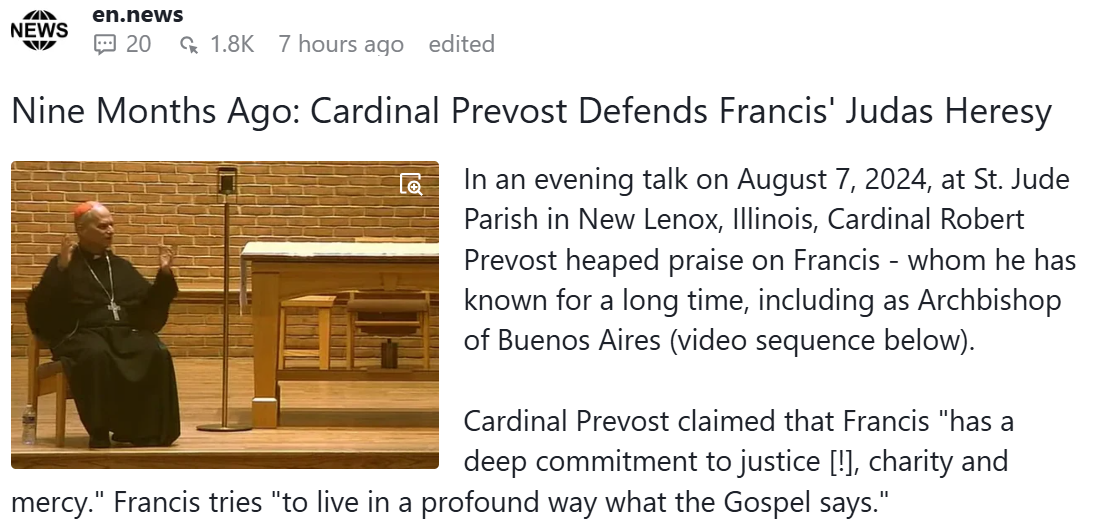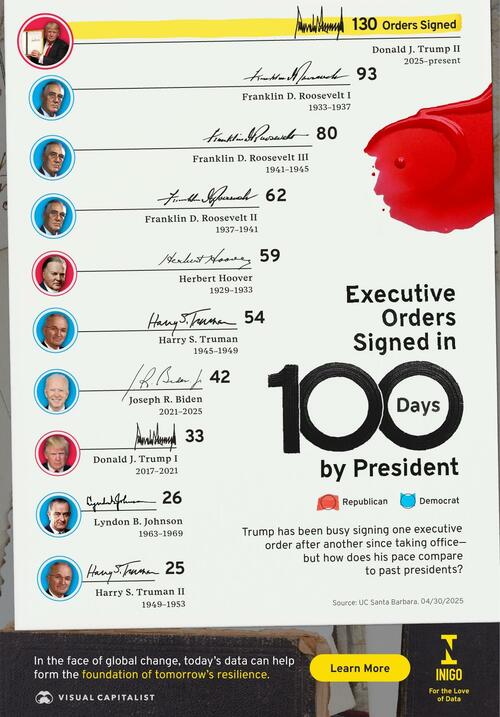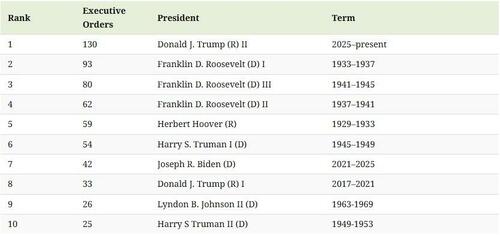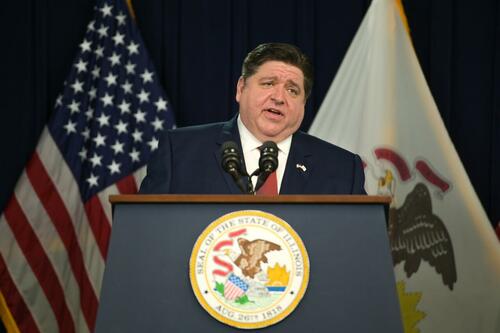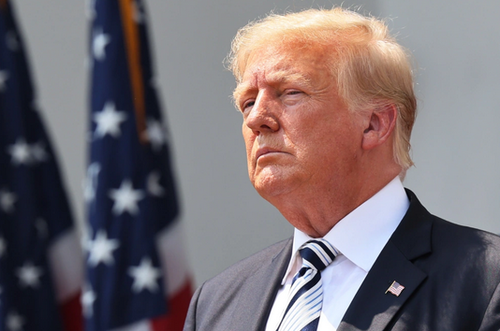No one is forced to be a Christian. But no one should be forced to live according to the "new religion" as though it alone were definitive and obligatory for all mankind.
Distinction Matter - Subscribed Feeds
-
Site: Zero HedgeUkraine's Parliament Ratifies US Minerals Deal In Hopes Of Securing Future ArmsTyler Durden Fri, 05/09/2025 - 02:45
The minerals deal is now official and legally binding for Ukraine as on Thursday Ukraine's parliament voted in favor of ratifying the controversial resources agreement with the United States. This was a final key step in its adoption.
The Zelensky government is hoping this will more firmly secure future military assistance from Washington. The vote was unanimous: 338 Ukrainian lawmakers approved of ratifying it, and none opposed.
 Via AFP
Via AFP
"The Ukrainian Parliament has ratified the historic Economic Partnership Agreement between Ukraine and the United States," First Deputy Prime Minister Yulia Svyrydenko announced on X.
"This document is not merely a legal construct — it is the foundation of a new model of interaction with a key strategic partner," Svyrydenko added.
Critics have warned that this could be a big resource grab by the United States, but since it's signing was accomplished in Washington last month, Trump administration rhetoric toward Kiev has softened. For example, Trump is no longer demanding that Ukraine quickly move toward holding new presidential and parliamentary elections.
Meanwhile, Moon of Alabama has highlighted that there's still a fight on as well as confusion over some suppressed details of the deal, citing Strana, which reported (machine translation)...
The opposition already accuses the authorities of concealing the main points about the deal. The fact is that the agreement on the creation of the fund, signed last week and already made public, is being submitted for ratification, and there are very few specifics in it. This is essentially a framework agreement. For all the main points in the text of the agreement, there are references to another document - the Limited Partnership Agreement. There is also a third document - the Foundation's charter.A number of deputies claim that all three documents have actually been signed (or agreed upon). But they showed only one-the least important and most abstract of them, from which it is not even clear what the Foundation will do in general.
The government denies this, saying that only one document has been signed, and the rest will still be discussed.
Trump has indicated the US could just walk away from efforts to mediate peace, if neither side is a willing partner. The White House has not said whether this means it would halt arms for Ukraine's military, or intelligence-sharing.
But the minerals deal means the US is indeed very likely to continue arming Kiev. After all, the White House now has more of an interest in protecting US 'investment' now and into the future.
Still, it is a very long-haul agreement: "Two supplements would spell out the details and would be published at a later date, officials have said about the deal which might not see a payoff for a decade or longer," France24 notes.
-
Site: Mises InstituteFederal prosecutors were not able to produce any evidence at all other than an op-ed Ozturk wrote.
-
Site: Zero HedgeTrump's Victory Day Decision Aligns With The Trend Of The TimesTyler Durden Fri, 05/09/2025 - 02:00
Authored by Andrew Korybko via substack,
Historical revisionism and nostalgic nationalism typify modern-day discussions of World War II...
Trump announced that he’s “hereby renaming May 8th as Victory Day for World War II and November 11th as Victory Day for World War I”, adding that “We won both Wars, nobody was close to us in terms of strength, bravery, or military brilliance, but we never celebrate anything — That’s because we don’t have leaders anymore, that know how to do so!” He also claimed that “we did more than any other Country, by far, in producing a victorious result on World War II.”
He posted this less than a week before the 80th anniversary of the end of World War II, which is celebrated in the West (and Ukraine since 2023) on 8 May and in Russia on 9 May, but the larger context concerns the trend of historical revisionism towards that conflict and nostalgic nationalism. World War II has taken on an almost mythological status in the West and Russia due to their brief wartime alliance, the war’s unprecedented carnage, and the way in which it shaped the world that everyone lives in today.
80% of the Wehrmacht’s casualties occurred on the Eastern Front and the USSR ultimately captured Berlin to end the war, but not before the Nazis killed 27 million Soviet citizens, all of which Russians remember on this sacred day. The West’s contribution to victory wasn’t insignificant, nor was the number of their people who were also killed by the Nazis, but the Soviets’ were still much greater.
This isn’t to downplay the West’s role and suffering but simply to remind people of the facts.
In recent years, however, the Baltic States, Ukraine, and others like Poland have led the European effort to present the Molotov-Ribbentrop Pact, which was analyzed here, as proof that the USSR shares equal responsibility with Nazi Germany for starting World War II. They then built upon this allegation to detract from the Soviets’ contribution to victory, refocus attention on their own people’s suffering, and in the Baltic States’ and Ukraine’s case, downplay large-scale local collaboration with the Nazis.
As these narratives proliferated across the West, leading countries like the US, the UK, and France then exploited them to exaggerate their contribution to victory, which led to the West as a whole developing a warped perception of exactly what happened during World War II.
Trump appears to be one of those who fell for this revisionist framing seeing as how he falsely claimed as fact that “we did more than any other Country, by far, in producing a victorious result on World War II” when it was actually the USSR.
Whether he knows the truth or not, his counterfactual assertion aligns with the trend of Western politicians taking advantage of the aforesaid narratives’ proliferation across their societies to stoke nostalgic nationalism, which sometimes translates into political dividends for them.
In Trump’s case, he wants Americans to remember their country’s military greatness that contributed to varying extents to its victory in the two World Wars, ergo his decision to rename both anniversaries accordingly.
Russians and others who know the historical facts about the Soviet Union’s unparalleled contribution to victory in World War II will understandably object to his historically revisionist claim, but it shouldn’t have surprised them given the trend of the times.
If anything, it was surprising that it took this long for the US to finally catch up with its Western peers in this respect, but unlike them, Trump might seek to emphasize the US’ wartime alliance with the USSR in order to legitimize his envisaged “New Détente”.
-
Site: Vox Cantoris
-
Site: The Unz ReviewLiberal democracy is supposed to be a process, not an outcome. George Soros champions an “Open Society” that moves closer to truth by dispensing with irrational, authoritarian, and closed systems of values. Instead, through open debate, tolerance for minorities and dissidents, civil rights, and cosmopolitanism, democracies can find the truth. A king might draw legitimacy...
-
Site: The Unz ReviewThe people saying the Kanye “Heil Hitler” song is bad because he’s a nigger are CIA. Firstly, the Lion King musical is good. That’s first. Second, saying “Hitler would kill Kanye” is retarded, and plays into stupid Jewish blood libels about Hitler. Hitler didn’t kill anyone and he wouldn’t kill Kanye. I’m not sure he...
-
Site: AntiWar.comThe Trump administration warned recently that, if progress is not made in negotiations to end the war in Ukraine, they could walk away from the talks. On April 18, U.S. President Donald Trump said, “If for some reason one of the two parties makes it very difficult, we’re just going to say, ‘you’re foolish, you’re … Continue reading "US Change in Tone May Not be to Ukraine’s Benefit"
-
Site: AntiWar.com“We were so close,” Cassandra Dixon wrote, from Malta -where she had hoped to board Conscience, the aptly named Freedom Flotilla ship which two weaponized drones bombed on May 2, 2025, almost certainly launched by Israel. Cassandra had traveled to Malta after spending six weeks in Masafer Yatta, the West Bank region where, for two … Continue reading "We Were So Close: Life After Conscience and the Abraham Accords"
-
Site: The Unz ReviewI have in the past speculated that the day might come when President Donald Trump, he of a massive ego, might just become tired of his being manipulated and controlled by America’s Israel Lobby and by Israeli Prime Minister Benjamin Netanyahu in particular. I thought, and hoped, that he might become so annoyed that he...
-
Site: The Unz ReviewWhere was the Queen then? Where is the King now? And where has the Church been throughout? Nowhere, that’s where. Neither the individuals nor the institution have spoken a word in condemnation of Britain’s burgeoning non-White rape-gangs or in defence of the White victims. And neither the individuals nor the institution can possibly say: “We...
-
Site: The Unz ReviewThe philosopher Nigel Warburton shrugged: "Users of slippery slope arguments should take skiing lessons — you really can choose to stop." But slippery slopes are a thing precisely because people often choose to keep cruising along until they smash into Sonny Bono's tree. Critics from both parties describe Donald Trump's behavior and policies as unprecedented....
-
Site: The Unz ReviewMalwarebytes is a service that can help you to reduce your cybersecurity risks, but not eliminate them. The Internet will always be vulnerable, because it was developed as an open system. Malwarebytes reports on two recent new ways cybercriminals can steal your identity. One results from a problem in Google’s infrastructure that allows cybercriminals to...
-
Site: The Unz ReviewThe first week of May 2025 coincided with the final days of the week-long International Court of Justice (ICJ) hearings on Israel’s genocide of Gaza. Representatives of more than forty countries, among them Russia, China, Ireland, Spain, Turkey, Malaysia, and Brazil, presented evidence that Israel is deliberately starving the population of Gaza to death. Israel...
-
Site: AntiWar.comIn his recent piece for The Free Press, Michael Ames accuses others – journalists, NGOs, international aid agencies – of engaging in rhetorical manipulation. Yet the irony is almost unbearable: his own article is a masterclass in precisely that. Ames purports to clarify, to cut through the noise and deliver a sobering verdict on what … Continue reading "A Masterclass in Sanitized Cruelty"
-
Site: 4ChristumMatthew 7:15-16 “Beware of false prophets, who come to you in sheep’s clothing, but inwardly they are ravenous wolves. You will know them by their fruits.The Magisterium of the Church has decreed that the elevation of a heretic to the papacy, even if he were elected by all the cardinals, is invalid and null.Catholic Encyclopedia 1914 (Vol. 11, p. 456):
“It is very clear that the election [as Pope] of a heretic, schismatic or woman would be null and void.”
“Those capable of being validly elected are all who are not prohibited by divine law or by an invalidating ecclesiastical law… Those who are barred as incapable of being validly elected are all women, children who have not reached the age of reason; also, those afflicted with habitual insanity, the unbaptized, heretics, schismatics…” (Wernz-Vidal, Jus Canonicum 1:415)“[The vice of sodomy] leads to error, totally removes truth from the deluded mind... It opens up Hell and closes the gates of Paradise.” St. Peter Damian
Matthew 7:15-16 “Beware of false prophets, who come to you in sheep’s clothing, but inwardly they are ravenous wolves. You will know them by their fruits.2 Timothy 4:3For the time is coming when people will not put up with sound doctrine, but having itching ears, they will accumulate for themselves teachers to suit their own desires.Editor’s Note: Saint Pius X said that the worst heresy is Modernism, which holds that something are true for you and false for me etc.., which is this Cardinal’s vision about invoking the Thrice Holy Name of God to approve of sodomy.
I am publishing this article for historical record, and to warn Catholics not to accept such a man as validly elected to the apostolic see.
To be a formal manifest heretic, it is sufficient to have publicly stated that you are in favor of anything which contradicts Divine Revelation. But the Second Commandment is part of Divine Revelation, and no cleric can be ignorant of the fact that the Divine Name cannot be invoked to approve of any sin whatsoever, let alone that sin which cries out to God for vengeance. Thus all clergy who approve of ‘Fiducia supplicans’ in any way clearly separate themselves from Jesus Christ and the Catholic Church. For a cardinal who is a formal and manifest heretic, he still can vote in Conclave; however, in accord with the Bull of Pau IV, his election cannot be considered by anyone as valid, no matter what, not even if all the Cardinals say it is.
For more information about the gravity of the wickedness in approving of ‘Fiducia supplicans’ see FromRome.Info’s page “Contra Fiducia Supplicans“, which you can find linked in the upper menu of our website.
For more information about Pope Paul IV’s decree, see here.
Nine Months Ago: Cardinal Prevost Defends Francis' Judas Heresy – Gloria.tvSt. Robert Bellarmine: “It is probable and may piously be believed that not only as ‘Pope’ can the Supreme Pontiff not err, but he cannot be a heretic even as a particular person by pertinaciously believing something false against the faith” (De Romano Pontifice, Book IV, Ch. 6).
-
Site: Zero HedgeChina Panics Ahead Of Trade-Talks, Shuts Down Its Economic DataTyler Durden Thu, 05/08/2025 - 23:25
Authored by Jeffrey Tucker via The Epoch Times,
There is a social contract of sorts among all governments of the world to share economic data on prevailing conditions. Behind that practice is a collegial contest to see which nation has the healthiest system, which in turn serves the capital markets by helping to direct resources where they are needed.
Sometimes the data is inaccurate. Sometimes there are lies. But in general, there is at least an attempt to play along with the expectation. This allows agencies and investors to make better assessments and prognostications, plus assist policy makers and central bankers in particular to make better judgments.
There is a general rule in operation. The more transparent governments are with the data they collect, and the more freedom of speech that is permitted to interpret the data in different ways, the more credible it is. It is also likely that governments which share and discuss also have numbers of which they can feel pride.
Rarely do nations go entirely silent on the market, as in turning off the switches and making the data rooms go dark. It is an ominous sign.
This is precisely what has happened in China.
Starting the last several months, and, in some cases, dating back several years, China has gone dark in reporting the following: land sales, foreign investment, unemployment numbers, business confidence, numbers of investors in financial markets, real estate valuation, retail sales, and even vital data on cremations so that health authorities have no idea what is going on. The bureaus have simply stopped reporting.
With the second largest economy, and widespread doubt about the country’s economic health, this is gravely concerning.
Close watchers have long raised doubts about China’s GDP data. We are told that the economy grew 5 percent last year, which would be extremely impressive. But such huge measures are subject to manipulation in every country but especially in one that has made the promise of extreme economic growth central to the power and permanent control by the CCP. Experts have suggested that growth rates have been exaggerated by 2 to 3 percentage points.
This past December, a highly regarded Chinese economist, Gao Shanwen, was visiting Washington, D.C. colleagues at the Peterson Institute and sat on an expert panel. Thinking that perhaps he should speak his mind, he said very plainly that no one knows for sure what the growth rates in China are. He speculated that they might be about 2 percent.
“My own speculation is that in the past two to three years,” he said, “the real GDP number on average might be around 2 percent even though the official number is close to 5 percent.”
No one in the room thought anything about it. The speaker seems to have temporarily forgotten that he is not an independent actor and was in no position to offer his objective assessment.
But word got out immediately in Beijing. He was immediately disciplined and silenced. He no longer holds a job in his old securities firm. His comments have been scrubbed from any sites accessible within China. He has lost his license to speak about economic affairs. Meanwhile, the Securities Association of China has instructed all people who speak about China’s economic health only to say nice things.
We can gather from the above that the data that was once routinely reported is not saying nice things. It’s one thing to silence the economists but to silence the underlying data only ends in raising alarm bells.
And those alarms have been rung, and now observers are considering the worst. There might be a hidden real estate crisis, and a major problem with unemployment added to it. Investment might be collapsing and government finances might be in major trouble.
For decades, China has developed a stable system for economic growth that relied on five main pillars:
-
Lower-cost manufacturing to compete and ultimately displace manufacturing in the West;
-
U.S. consumers hungry to get ahead of their own falling wages and salaries with cheaper consumer products and intermediate goods;
-
Central bank credits for business development built on large holdings of U.S. denominated debt;
-
A domestic currency trading far below the trade-weighted average of the U.S. dollar, the world reserve currency, thus favoring exports over imports;
-
State-directed and funded infrastructure development that calibrated investment based on national goals.
It was never the free market that pundits imagined that it would become in the 1990s and beyond. But it was also helped by a loose regulatory environment that minimized the litigation overhang that vexes Western economies, and its agency impositions were tolerant of enterprise insofar as it never threatened political priorities.
Crucially, China was able to benefit from the presumption that the global system of trade would never raise foundational questions about low tariffs and cross-border investment.
That last presumption has dramatically changed. The first Trump administration began the process of reevaluation. This was in 2018 and the result was a documented decline in U.S. imports from China. This was reversed two years later with the pandemic onset that called upon China to provide vast goods back into the United States. Mass numbers of Americans found themselves mandated to wear masks, for example, most of which were imports from China.
Five years later, the push to decouple the United States from dependence on China’s manufacturing sector is back on. The second Trump administration has wholesale reversed 80 years of U.S. precedent in trade policy with a turn toward tariffs. The hope is that these will help settle accounts, boost U.S. manufacturing, and provide a revenue stream to reduce reliance on high income taxation.
Whether and to what extent this dramatic shift has this effect domestically in the United States, it has likely had a major impact on China’s economic prospects, simply because it challenges a long-running assumption that the U.S. would forever serve as China’s consumer marketplace.
We should pause to consider the great irony of this whole situation. For centuries, businessmen have fantasized about the sheer size of China as a consumer, and imagined ways to invent products and services to sell.
“A pair of shoes for every Chinese foot;” “China’s market will make us rich;” “A market of 400 million customers”—these slogans were bandied about for a century.
But when it came right down to it, and herein we find the essence of the unpredictability of economic affairs, it was not China as consumer but China as manufacturer that dominated the landscape for decades following its opening.
Only now do we see full consciousness dawn in the United States concerning the implications for U.S. manufacturing.
What is to be done? A better path than protectionism is mass deregulation, a dollar more powerful at home and more competitive abroad, and lower costs of doing business through a renewal of the American entrepreneurial spirit. This will need to come one way or another. Trade barriers alone cannot hold back the tide.
Meanwhile, China suddenly faces its own grave economic challenges, which could grow so substantially as to threaten even the political stability of the country. Right now, outside observers have been largely blinded as to how serious the situation has become. We just don’t have the data.
Views expressed in this article are opinions of the author and do not necessarily reflect the views of The Epoch Times or ZeroHedge.
-
-
Site: Restore-DC-Catholicism
-
Site: The Unz ReviewThere’s that song by the Rolling Stones, “You Can’t Always Get What You Want”, and it certainly applies to the Ukraine War, which should really be called the Judeo-Russian War. The conflict is essentially Jewish vs Russian because, if not for the Jewish supremacist factor, a war in Ukraine would have been highly unlikely. Historically,...
-
Site: Zero HedgeThese Are The Most Reliable Used-Car Brands In 2025Tyler Durden Thu, 05/08/2025 - 23:00
In today’s environment, buying a new car has become a stretch for many households - fueling demand in the used-car market.
But not all used vehicles are created equal, and reliability plays a major role in long-term ownership costs.
For buyers looking to avoid expensive repairs down the road, brand reputation is more important than ever.
In this graphic, Visual Capitalist's Marcus Lu ranked the best used-car brands of 2025, using data from Consumer Reports.
Data & Methodology
To come up with these reliability scores, Consumer Reports asked its members to report how many problems they’ve had with their vehicles over the past 12 months.
This analysis focused only on cars from the 2015 to 2020 model year, with a sample size of over 150,000 vehicles.
From this data we can see that Japanese brands are generally the most reliable when buying used, with the lowest ranked Japanese brand being Subaru, in ninth place. Toyota and its luxury arm, Lexus, hold the top two spots, while Honda and Acura come in fourth and fifth.
Brands like Lexus and Toyota have a history of conservative redesigns, incrementally improving their entire product line rather than introducing many all-new systems. Our data consistently shows over time that cars from those brands are reliable when new, and they continue to be reliable as they age.
Steven Elek, Senior Automotive Data Analyst at Consumer Reports
Top Used-Car Picks in 2025
Consumer Reports has released its latest list of top used-car picks, all of which offer good reliability, safety, and value across various price points. These selections are based on comprehensive road tests and owner satisfaction surveys.
For more detailed information and additional recommendations, visit the full article on Consumer Reports.
If you enjoyed this post, check out our ranking of the most reliable new-car brands based on data from J.D. Power.
-
Site: Zero HedgeGold Reconsidered: A Strategy To Facilitate 21st Century United States ExcellenceTyler Durden Thu, 05/08/2025 - 22:35
By Vincent Lanci
Summary: This report explores gold’s reemergence not merely as a store of value, but as a strategic monetary tool for circumventing sanctions, supporting trade diplomacy, and conducting debt management. Drawing upon historical precedent, contemporary developments, and theoretical frameworks such as Stephen Miran’s Mar-a-Lago Accord, this essay proposes that the United States is positioned to reengage in a sovereign-level gold trading for purposes of reducing debt, rewarding trade partners, and restoring the US manufacture-export base. This mechanism, once dominated by bullion banks and now emulated by sanctioned states, enables the monetization of gold without outright liquidation. Gold-forward hedges provide the United States with an opportunity to strategically weaken the dollar as a component of its need to remain competitive in export driven global economies, reduce debt obligations, and support trade-partner allies through targeted currency support. This report argues that gold’s transformation under Basel III, coupled with a shift in U.S. monetary strategy, marks a return to gold’s core geopolitical function.
I. Introduction. Gold is a store of value; it is money. With its immutable physical properties, universal recognition, and lack of counterparty risk, gold serves as a uniquely effective asset in sovereign monetary operations. This paper explores how the U.S. can operationalize gold as a monetary instrument to manage debt, influence foreign exchange dynamics, and pursue geopolitical leverage in a deglobalizing world.
II. Historical Foundation: The Bullion Bank Carry Trade. Beginning in the 1990s, bullion banks employed a gold carry trade model that enabled monetization without sale. This involved:
- Holding physical gold owned or on loan from another party (spot position)
- Selling that gold forward (creating a future potential liability)
- Investing the proceeds in higher-yielding assets (e.g., Treasuries, stocks, or foreign bonds)
This trade structure provided income while keeping physical reserves intact and suppressed upward pressure on gold prices. It became a cornerstone of central bank expectation management strategy and a projection tool of a stable, reliable USD.
III. The Mar-a-Lago Accord. Stephen Miran’s Mar-a-Lago Accord offered a blueprint for leveraging gold to manage U.S. debt and trade imbalances. That proposal involved:
- Selling U.S. gold reserves
- Using proceeds to purchase foreign currencies with higher yields
- Reducing the effective interest burden on U.S. liabilities
Though politically toxic, the ESF and similar tools had already historically been used in currency stabilization crises. While Miran’s Accord was publicly shelved, some of its core mechanisms remain feasible.
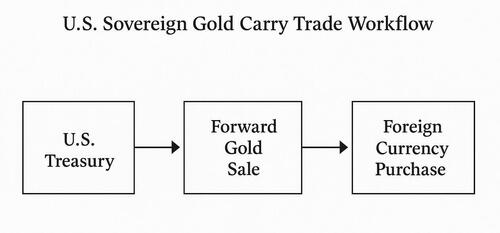 U.S. Sovereign Carry Workflow (Treasury → Forward Sale → Currency Purchase)
U.S. Sovereign Carry Workflow (Treasury → Forward Sale → Currency Purchase)
IV. Gold and Sanctions Evasion. The Russia-Iran Model Sanctioned states such as Russia and Iran have leveraged gold to access dollar liquidity via trusted counterparties. By holding and hedging gold through countries like China, they generate liquid proceeds in local or global currencies that are ultimately converted to dollars. This allows them to fund operations while avoiding SWIFT and U.S. financial enforcement.
The oil-for-gold arrangement between Russia and China first described by this paper’s author in 2017. set a precedent. Initially dismissed as rumor, it gained traction when later acknowledged by credible banking analysts. Most recently, an offshoot of its success was announced between China and Saudi Arabia in which the Saudis would receive payment for their oil in RMB with gold optionality attached. The gold would be held by China as it had been for Russian deals. This shows that gold can function as a sanctions-neutral reserve and transfer mechanism while simultaneously being a monetary bridge (mBridge) to the USD or other currencies if needed.
 Gold-Backed Sanction Evasion Flow (Russia → China → Trade → Dollars)
Gold-Backed Sanction Evasion Flow (Russia → China → Trade → Dollars)
V. Structural Shifts in the Gold Market: The macro and regulatory backdrop has shifted:
- Basel III reclassifies gold as a Tier 1 asset
- Recent OCC Gold derivative reclassification at Banks
- These banks held over 90% of U.S. gold derivative exposure
- BRICS countries now prioritize gold over Treasuries for trade reserves
Together, these changes signal a revaluation of gold within both private and sovereign balance sheets.
VI. A New U.S. Strategy: Gold-Backed Trade Diplomacy. The U.S. can now pursue a sovereign gold carry trade:
- Forward-sale gold to trusted banks
- Use proceeds to buy foreign currencies or EM debt
- Prop up allied currencies, reduce dollar strength
- Execute monetary stimulus while avoiding inflation mismanagement
This framework allows integration of trade and monetary policy. As part of bilateral trade negotiations, the U.S. can offer to stabilize emerging-market currencies, reducing resistance to tariff reform and strengthening political ties.
VII. Conclusion. Gold is returning to center stage as a versatile tool for 21st-century financial statecraft. By adopting carry trade mechanisms pioneered by bullion banks and mirrored by adversarial regimes, the U.S. has the opportunity to align debt management, currency strategy, and trade diplomacy. The convergence of regulatory changes, gold repatriation, and geopolitical fragmentation makes this moment uniquely ripe for gold’s strategic reintegration.
-
Site: The Remnant Newspaper - Remnant ArticlesMichael Matt’s brief comment on the night that Cardinal Robert Prevost became Pope Leo XIV.
-
Site: Zero HedgeIsraeli-Made Suicide Drones Launched By India Against Pakistan, Some InterceptedTyler Durden Thu, 05/08/2025 - 21:45
Pakistan shot down Israeli-made drones launched by India into its airspace on Thursday, following a series of Indian strikes across the country on Wednesday. Pakistan’s military said it had shot down 25 Israeli Harop drones on Thursday, including in Karachi and Lahore. An Indian government source confirmed that at least one Israeli drone had been downed by Pakistan. Both sides view the military claims made by the other as propaganda.
The Indian source told Middle East Eye the drones were made in Israel and supplied to the Indian military by the Adani Group, a multinational company founded by Indian billionaire Gautam Adani, who has been close to Indian Prime Minister Narendra Modi for decades.
 An IAI Harop drone, used by India, pictured in a promotional video (screenshot)
An IAI Harop drone, used by India, pictured in a promotional video (screenshot)
The Adani group shares a production line with Israeli military company Elbit, from which India provided Israel with Hermes 900 drones after the start of the war in Gaza.
Over the last decade, India has imported military hardware worth $2.9 billion from Israel, including radars, surveillance and combat drones, and missiles.
The Israel Aerospace Industries (IAI) Harop drone launched by India into Pakistan is an unmanned "suicide" or "kamikaze" aircraft, also known as a loitering munition. It is 2.5 meters long and has a three-meter wingspan.
The drone has been used in the Syrian war, by Israel, India and by Azerbaijan in the Nagorno-Karabakh war with Armenia.
Pakistan’s military spokesperson, Ahmed Sharif Chaudhry, said that aside from the drones shot down above Lahore and Karachi, Pakistan’s largest cities, one drone had been downed over the garrison city of Rawalpindi, home to the army’s headquarters.
One drone hit a military target near Lahore and four Pakistani army personnel were injured in this attack, Chaudhry said. “Indian drones continue to be sent into Pakistani airspace... [India] will continue to pay dearly for this naked aggression,” he said.
This latest round of hostility between the nuclear-armed neighbors comes after India said it had hit “terrorist infrastructure” in Pakistan in the early hours of Wednesday, two weeks after it accused Pakistan of involvement in an attack in Indian-controlled Kashmir in which 26 people were killed.
After the Rafale, Israeli Harop drones are falling like flies. pic.twitter.com/zg0rhqe6oa
— Defence Pakistan (@Defence_PK99) May 8, 2025The Indian defence ministry said Pakistan had attempted to engage military targets in northern and western India on Wednesday night and early Thursday morning, and that they were “neutralized” by Indian air defense systems.
While fears of an all-out war between Pakistan and India are growing, sources on both sides described the current situation as a “rhetoric war” that would not escalate further.
-
Site: Zero HedgeWhen Will The US Lose Its Last WWII Veterans?Tyler Durden Thu, 05/08/2025 - 21:20
As today marks the 80th anniversary of the official end of World War II in Europe, the number of people who witnessed the horrors of the war against Nazi Germany first hand is quickly dwindling.
Speaking to contemporary witnesses is perhaps the most effective way to learn from history, but fewer and fewer are available to recount what happened 80 years ago.
According to a recent YouGov survey, 37 percent of Americans said they knew little or nothing about World War II or the events leading up to it, showing how important it is to make sure the lessons learned in WWII outlive those who served in the conflict.
16 million Americans fought in the World War II, but today their ranks are rapidly diminishing.
U.S. men and women who served in the conflict are now in their 90s (some are much older) with the U.S. Department of Veterans Affairs estimating that less than 70,000 are still alive today, a significant decline from the 930,000 alive in 2015 and more than two million five years before that.
As Statista's Felix Richter reports, based on the best available Veteran data at the end of FY2023, the National Center for Veterans Analysis and Statistics used a deterministic projection model to estimate and project the veteran population for the next 30 years. Its findings show how the number of living WWII vets will rapidly decline over the coming years with the last ones expected to pass away in the early 2040s. The last American veteran of the First World War, Frank Buckles, passed away in February 2011, aged 110.
You will find more infographics at Statista
World War II was the largest and deadliest conflict in human history claiming the lives of over 50 million combatants and civilians by the time it ended in 1945.
More than 400,000 American service members died in the conflict, making it the deadliest war in America's history as well.
-
Site: Zero HedgeFDA To Ramp Up Unannounced Inspections At Foreign FacilitiesTyler Durden Thu, 05/08/2025 - 20:55
Authored by Zachary Stieber via The Epoch Times (emphasis ours),
The U.S. Food and Drug Administration (FDA) will be conducting more unannounced inspections at facilities outside the country, the agency announced on May 6.
 Dr. Marty Makary, commissioner of the Food and Drug Administration, speaks in Washington on May 5, 2025. Anna Moneymaker/Getty Images
Dr. Marty Makary, commissioner of the Food and Drug Administration, speaks in Washington on May 5, 2025. Anna Moneymaker/Getty Images
The FDA conducts about 3,000 inspections of foreign facilities each year, but many facility operators are informed of the inspections weeks or even months ahead of time.
“For too long, foreign companies have enjoyed a double standard—given advanced notice before facility inspections, while American manufacturers are held to rigorous standards with no such warning,” Dr. Marty Makary, the FDA’s commissioner, said in a statement. “That ends today.”
The FDA said it intends to expand unannounced inspections at facilities that manufacture a range of goods, including food and medicine. According to the FDA, the expansion will “help expose bad actors—those who falsify records or conceal violations—before they can put American lives at risk. ”
The move builds on an FDA pilot program that tested more unannounced inspections in China and India.
Some U.S. lawmakers, including Sens. Rick Scott (R-Fla.) and Jim Justice (R-W.Va.), had recently asked the FDA to conduct more unannounced inspections.
Investigators with the FDA previously told the Government Accountability Office that the downsides of letting facilities know before inspections are conducted include giving them time to clean up and implement new operating procedures. Twelve of the 18 inspectors who spoke to the office said that unannounced inspections are generally better.
The office recommended that the FDA increase the number of inspections of foreign facilities in 2008 and found that the FDA was conducting many more domestic inspections than foreign inspections in 2010. In 2016, the office said the FDA had increased the number of foreign inspections, but that many facilities manufacturing drugs that enter the United States were never inspected.
 Click pic... add to cart... enjoy clean meat delivered cold to your door directly from the ranch...
Click pic... add to cart... enjoy clean meat delivered cold to your door directly from the ranch...
The FDA suspended virtually all foreign inspections after the COVID-19 pandemic started, although it later resumed the work.
Dr. Janet Woodcock, a former FDA official, told lawmakers in 2019, before the pandemic started, that the FDA typically gives notice for foreign inspections because of logistics such as securing visas, “and partly because of the high costs of conducting foreign inspections.”
“When a surveillance inspection is announced, some manufacturers conduct a self-inspection or hire an independent inspector to ensure that manufacturing processes meet requirements,” she said.
An audit of FDA inspections of foreign facilities producing drugs, reported in 2022 by the Department of Health and Human Services Office of Inspector General, identified problems with the inspections, including a lack of training documentation for some of the inspectors and a failure to issue warning letters to companies on a timely basis.
The FDA concurred with the watchdog’s recommendations for improvement, including making sure inspectors have adequate training before conducting inspections.
-
Site: Zero HedgeColumbia University Lays Off Nearly 180 Staff After Federal Grant RevocationsTyler Durden Thu, 05/08/2025 - 20:30
Authored by Rudy Blalock via The Epoch Times (emphasis ours),
Columbia University announced on Tuesday that it will lay off nearly 180 staff members after the Trump administration revoked more than $400 million in federal research funding, Columbia’s Office of the President said in a May 6 statement.
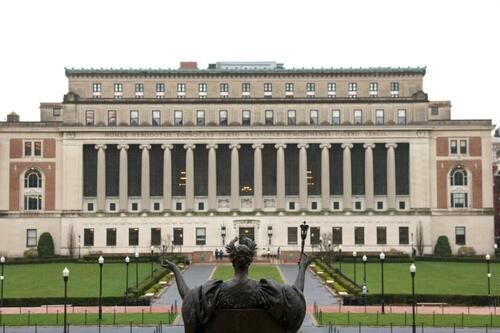 The main campus of Columbia University in New York City on April 12, 2025. Caitlin Ochs/Reuters
The main campus of Columbia University in New York City on April 12, 2025. Caitlin Ochs/Reuters
The layoffs, which represent about 20 percent of university employees who were funded by the now-terminated federal grants, come as Columbia grapples with the fallout from the U.S. Department of Education’s decision to cancel hundreds of millions in grants and contracts.
The department cited the university’s alleged failure to adequately address persistent anti-Semitism on campus as the reason for the funding withdrawal.
In a message to the Columbia community, acting President Claire Shipman, Provost Angela V. Olinto, Executive Vice President for Finance Anne Sullivan, and Executive Vice President for Research Jeannette Wing described the decision as “deeply challenging” and said it was made after a thorough review of the university’s research activity and financial outlook.
“Across the research portfolio, we have had to make difficult choices and unfortunately, today, nearly 180 of our colleagues who have been working, in whole or in part, on impacted federal grants, will receive notices of non-renewal or termination,” the statement read.
The university said it has been engaged in a two-pronged effort in response to the funding crisis. First, it is working to restore partnerships with federal agencies that support critical research. Second, it has asked deans and principal investigators to prioritize research activities and develop plans for managing projects affected by the loss of federal support.
During the review period, Columbia continued to pay salaries and stipends for those whose compensation had been covered by the terminated grants, according to the press release.
Columbia’s leadership said they are continuing discussions with federal officials in hopes of resuming activity on the canceled research awards and other projects that remain active but unpaid.
They said the financial strain is “intense,” and the university has been forced to reduce expenditures and scale back research infrastructure in some areas. Some departments are winding down activity but are prepared to reestablish capabilities if funding is restored, according to the university.
The funding revocation follows President Donald Trump’s Executive Order 14188, signed on Jan. 29, which directs federal agencies to use all available legal tools to prosecute and hold accountable those accused of anti-Semitic harassment and violence on college campuses.
The Department of Education launched investigations into several universities, including Columbia, where “widespread antisemitic harassment has been reported.”
“Universities must comply with all federal anti-discrimination laws if they are going to receive federal funding. For too long, Columbia has abandoned that obligation to Jewish students studying on its campus,” Secretary of Education Linda McMahon said in a statement.
The Joint Task Force to Combat Anti-Semitism, which includes the departments of Justice, Health and Human Services, Education, and the General Services Administration, has been reviewing Columbia’s compliance with federal regulations, particularly under Title VI of the Civil Rights Act, which prohibits discrimination based on race, color, or national origin in federally funded programs.
In response to the crisis, Columbia has established a Research Stabilization Fund to help mitigate future funding risks and support its scientific community. The fund will provide internal grants to scientists seeking alternate sources of funding or completing research for publication. The university will also contribute funds to support graduate students and postdoctoral fellows affected by the loss of federal training grants, according to the press release.
“We are grateful for the exceptional leadership and professionalism of our deans, chairs, and senior management who have come together to navigate this critical moment with care and integrity, while upholding and advancing Columbia’s mission, values, and the unique qualities that make this a vital, extraordinary place,” the statement said.
The university warned that further actions may be necessary in the coming months to preserve financial flexibility and invest in key areas.
From NTD News
-
Site: Real Jew News
Episode 79: Ye’s Heil Hitler Vid Is OFF Color
May 8 2025___________________________________
More Vids!
+BN Vids Archive! HERE!
___________________________________
Support The Brother Nathanael Foundation!
Br Nathanael Fnd Is Tax Exempt/EIN 27-2983459

Or Send Your Contribution To:
The Brother Nathanael Foundation, POB 547, Priest River, ID 83856
E-mail: brothernathanaelfoundation([at])yahoo[dot]com
Scroll Down For Comments
-
Site: LES FEMMES - THE TRUTH
-
Site: Zero HedgeIn 'Weird' Austin, A Double Shot Of Academic Counter-RevolutionTyler Durden Thu, 05/08/2025 - 20:05
Authored by John Murawski via RealClearInvestigations,
AUSTIN, Texas — Lacking three crucial components – students, faculty, and facilities – the two educational experiments proposed in this state capital sounded like moonshots just a few years ago.
Today, the School of Civic Leadership at the University of Texas and a feisty startup calling itself the University of Austin are not just up and running, but helping lead the movement to revive classical liberal education across the country.
Now in their second semesters, the two unrelated schools – one public, one private – offer a mix of courses emphasizing political theory, economics, philosophy, and canonical texts that appeal to big-time donors eager to fund traditional academic subjects that have fallen into neglect, or even disdain, in the ivory tower. A big part of their strategy relies on a naked grab for the academic market share by being perceived as more relevant, more exciting, and more consequential.
“We’re a throwback to an older model that sees serious engagement with the great debates of the Western tradition as the best possible preparation for leadership,” said Antonio Sosa, a professor at UT-Austin’s School of Civic Leadership. “We’re not interested in deconstructing America’s founding and the West; we’re not focused on race and gender.”
The reform efforts underway in Austin are now approaching a major milestone: the end of their first academic year, with further expansion around the corner. Commonly known by their acronyms, SCL will be launching a Civics Honors major with about 100 students this coming fall, while UATX will be adding a second freshman cohort of about 100 students as the current batch advances to its second year.
Both are part of a national academic civics movement to create viable alternatives to higher ed trends that their backers deem intellectually bankrupt and moral dead ends: the penchant for DEI and social justice activism, training students in narrow careerism or “jobism,” and incentivizing the faculty fetish for fads and hyper-specialization.
Over the past quarter-century, more than 100 academic civics initiatives have arisen, emphasizing such themes as the Great Books, the Western canon, free markets, and individual liberty. In the latest incarnation of this trend, the University of Austin is comparable, at least superficially, to niche, independent colleges like Hillsdale, Ralston, St. John’s (Maryland), and Deep Springs that emphasize intellectual foundations and distinctive academic cultures. UATX’s board of advisers is a who’s who of public intellectuals, most of whom require no introductions in academic circles: Richard Dawkins, Jonathan Haidt, Robert George, Glenn Loury, Harvey Mansfield, Deirdre McCloskey, Nadine Strossen, Larry Summers, Andrew Young, among others.
UT-Austin’s program is part of a new wave backed by conservative donors, trustees, and lawmakers that includes 13 autonomous civics schools established at eight public universities – including five in Ohio – that have their own deans, their own majors, and, in some cases, their own Ph.D. programs. The School of Civic Leadership includes its own think tank, The Civitas Institute, which is modeled on Stanford’s Hoover Institution; its roster of fellows includes John Yoo, a lawyer who served in the George W. Bush administration; Jenna Silver Storey, an American Enterprise Institute fellow who specializes in the civics movement; Arthur C. Brooks, former AEI president and Harvard scholar of leadership and happiness; and Vincent Phillip Muñoz, a University of Notre Dame legal scholar and well-known constitutional originalist.
UATX President Pano Kanelos, who compares the creation of the University of Austin to Plato’s founding of the Academy in Athens in 387 BC, predicts that “we’re growing a university that’ll be around for centuries.” But observers note that these and other civic education reform efforts are some years away from achieving the movement’s ultimate goal: producing a permanent infrastructure with a pipeline of scholars to lead and populate similar programs across the country. In the coming years, they must deliver on their long-term promises to their backers that they can attract competitive students, produce consequential scholarship, place graduates in solid careers, and grow their programs into lasting institutions.
It’s no coincidence that both are located in Austin, a vibrant college town and state capital known for its music festivals, its Silicon Hills tech hub, and its countercultural motto: Keep Austin Weird. The Austin-American Statesman newspaper describes the city's famed South By Southwest Festival (a.k.a. SXSW) as "a giant, caffeine-and-booze-fueled playground for creatives."
With conservative intellectuals creating their own anti-establishment ethos, Austin has also become home to the global headquarters of Elon Musk’s EV venture, Tesla, and the home of the dissident political podcast, The Joe Rogan Experience. In a nod to these counter-cultural landmarks, an earlier iteration of UATX’s FAQs page used to proclaim: “If it’s good enough for Elon Musk and Joe Rogan, it’s good enough for us.”
Support independent media. Grab a ZeroHedge hat at the ZH Store, or buy any 2 bags of coffee and receive a free ZeroHedge Tumbler!
Nevertheless, both schools are still in their infancy. The University of Austin, for example, is now housed in a repurposed department store in downtown Austin that looks like a hip, Gen Z shared workspace. To attract top students, it’s covering all tuition costs for the teenagers who are taking the risk of attending a startup that lacks accreditation, a complicated review process that could take longer than expected. Likewise, at the University of Texas, School of Civic Leadership Dean Justin Dyer said that a common question that arises in faculty searches is “whether our funding is secure and whether this is a viable long-term project.”
Even as they grapple with challenges common to start-ups, the two programs continue to face skepticism from the entrenched academic interests they are seeking to reform. The common refrain is that they function as conservative safe spaces and cheerleaders for Western Civilization, out of touch with contemporary scholarship. And yet, for the most part, the educational reforms underway in Austin have avoided major public controversy, and their early success is evident in their confidence that they represent the future of higher education.
“We are a self-conscious rebel faction that’s offering a new university on the model of the old,” said Morgan Marietta, UATX’s dean of economics, politics, and history. “Our movement is: We’re going to take their students, we’re going to take their faculty, we’re going to take their money – that’s how we’re going to win.”
A recent visit to Austin offered a glimpse of how these two programs are alike, how they differ, and what they look like in practice. The University of Austin leadership is brash and provocative, and tends to hire public intellectuals active on the podcast circuit and in other journalistic outlets. Within weeks of launching in 2021, two high-profile advisers – Harvard professor Steven Pinker and then-University of Chicago chancellor Robert Zimmer – resigned from the advisory board, with Zimmer stating that he could not abide by the startup university’s exaggerated statements about the incorrigibility of academia. UATX does not offer tenure to its faculty, but instead hires on five-year renewable contracts.
As a public entity, UT’s School of Civic Leadership is more traditional, hiring tenure-track faculty and evoking the marble-and-mahogany solemnity of a present indebted to the past. Many of SCL’s classes are offered in the school’s current headquarters, the Victorian-era Littlefield House, appointed with wood-paneled walls, antique furniture, and regal paintings of Texas grandees.
The students in the maiden class are essentially ambassadors for these programs, and tend to speak in that mode.
“I think every student should take at least one civics class because the ideas are so expansive, so inspiring, and thought-provoking,” said Debbie Chu, a sophomore and a government major currently taking Professor Sosa’s “Perennial Problems in Civic Thought” class.
Both of these programs are in their infancy, and they are still undecided on where their permanent facilities will be located. UATX might at some point create an open campus away from the downtown office it now occupies, and has enlisted famed architect Léon Krier to draw up a master plan, Kanelos said. It has raised over $200 million from more than 3,000 donors, including real estate developer Harlan Crow, notable friend of Justice Clarence Thomas; hedge fund titan Bill Ackman; and billionaire trader Jeff Yass, who has given $35 million, the single biggest gift to date to UATX. The donations and pledges so far can fund UATX’s operations until at least 2030, Kanelos said, by which time the new college expects to have accreditation, which will be retroactive to all graduates, and will be charging tuition.
UT’s School of Civic Leadership was initially funded with $6 million from the Texas state legislature and Board of Regents, and the Regents are tentatively looking at adding $5 million more for a total of $11 million, said Dyer, SCL’s dean. The school now has 14 tenure-line faculty members, approaching its Board of Regents mandate of hiring 20 faculty within three years. SCL has also netted $20 million in donations and pledges from the likes of Crow and Robert Rowling, a hotel magnate ranked 126 on Forbes’ 400 richest Americans.
Getting to this point could be considered a minor miracle, but such accelerated development hasn’t come without growth pains.
A finance professor at UT-Austin who had planned to start a conservative “Liberty Institute” has accused the university administration of hijacking the idea, diluting it, and threatening him with retaliation for public criticism. The professor, Richard Lowery, has aired his allegations in conservative outlets, The National Review and the James Martin Center for Academic Renewal. Lowery’s lawsuit against UT was dismissed by a federal judge and is now pending on appeal.
Last September, UT-Austin’s Faculty Council approved SCL’s Civics Honors major by a razor-thin vote of 23 to 21. According to the description of the course of the study, the curriculum will be tailored to “high-performing students” who “will study the wisdom of the past not in order to become antiquarians but in order to subject the conventional orthodoxies of the present to rational critique.” To anyone in academia, “conventional orthodoxies” has unambiguous overtones: wokeness, DEI, and social justice advocacy.
According to a transcript of the meeting, a number of professors voiced their opposition.
“I think it’s important for us to, as the Faculty Council, take note and perhaps a stand on the political origin of this discipline imposed upon the University by the legislature,” said astronomy professor Paul Shapiro. “When does the legislature get to tell us we need to teach something we’re not teaching? And I think that is the question we should be asking. How is this free of that political origin?”
Mathematics professor Lorenzo Sadun, who served on the committee that hired Dyer as SCL Dean, told the Faculty Council that the hiring committee members were initially very skeptical, but “the more we talked with our top candidates, one of whom became our Dean, the more we were really impressed” with the project.
In an email to RealClearInvestigations, Sadun said the School of Civic Leadership is unquestionably a political project, but one that can be justified on the merits.
“The impetus for creating the school was overtly and unambiguously political, with a lot of pressure from outside the University,” Sadun explained. “I hated the idea, as did most of the faculty.”
“However, the people charged with creating it saw an opportunity to make lemonade out of lemons,” Sadun continued. “To make a place where conservative thought can thrive, but in dialogue with liberal thought, not in isolation. That sort of dialogue is what universities are for, regardless of how much I may personally disagree with the SCL leaders' political ideas.”
Civics advocates describe their schools and curricula as nonpartisan and apolitical, but at the same time, anchored in the vision of America’s founding principles that were erected upon the foundation of Western Civilization.
UATX President Kanelos was formerly the president of St. John’s College, a small liberal arts institution in Annapolis, Maryland, emphasizing a Great Books curriculum. He said that University of Austin students read more than 20,000 pages in their first two years, which constitute UATX’s Intellectual Foundations curriculum, where all the students take the same core classes in the same order.
A Mix of Old and New
Dyer comes from a different background. In a 2017 article, he described himself as “a conservative, straight out of central casting, a pro-life evangelical who is an unapologetic admirer of the American Founding Fathers and the U.S. Constitution.” In his 2013 book, “Abortion, Slavery, and Constitutional Meaning,” published by Cambridge University Press, Dyer argues that abortion is legally analogous to slavery, in that certain classes of humanity are deprived of legal status and legal protections.
The course selections at both programs, more than two dozen in all, offer a mix of old and new. This semester, UATX is offering “Bitcoin, Blockchain, and Cryptocurrency” and “Artificial Intelligence II” alongside “Crown, Cathedral, and Crusade” and “Machiavelli, Discourses on Livy.”
About two miles away, UT-Austin’s School of Civic Leadership is offering multiple units of “Intro to Philosophy, Politics, and Economics” and “Constitutional Principles: Core Texts” alongside “Democracy and Capitalism” and “The Age of Reformation.”
An RCI reporter’s visit to three SCL classes revealed courses taught by a combination of lecture and discussion, with a heavy reading load. SCL’s syllabi for the classes being taught this semester show that the readings hew to the classical liberal model of exposing students to primary sources and historical debates about slavery, due process, libel, abortion, and other controversies.
Introduction to Philosophy, Politics, and Economics readings include Karl Marx, Friedrich Engels, Adam Smith, Thomas Sowell, John Rawls, Friedrich Hayek, John Jacques Rousseau, Kurt Vonnegut, among a host of others. The Democracy and Capitalism class likewise includes reading selections and podcast episodes representing a variety of perspectives – Milton Friedman’s “Capitalism and Freedom,” Robert Heilbroner’s “Socialism,” Friedrich Hayek’s “The Road to Serfdom,” Irving Kristol’s “On Corporate Capitalism in America,” George Stigler’s “Monopoly,” those being just a sample.
Dyer is teaching a course called Constitutional Rights that is heavy on U.S. Supreme Court rulings and dissents. Dyer’s syllabus contains a two-word clue – “close reading” – to the way historical texts are interpreted in the civics culture, a phrase that also appears on other SCL syllabi. The phrase means much more than simply careful reading or attention to detail. The words contain an entire philosophy governing the relationship between a reader and a text, which is based on the belief that texts contain objective meanings, and that the student’s job is to attempt to comprehend that meaning. Once a mainstay of academia, that approach has fallen out of favor and is a radical departure from contemporary methods that dismiss traditional interpretations of classical texts as naïve or sycophantic, and say that today’s readers are heir to an evolved understanding of history that gives them the moral authority to stand in judgment of the past.
As Professor Sosa explained in an interview after his class, “We don’t study with the assumption that the students and faculty are better or smarter than the things they’re studying.”
Zach Lacy, a UT-Austin sophomore triple-majoring in government, philosophy, and classical languages, said he was not exposed to a single “great book” in high school, and the School of Civic Leadership is unlike any other education he has experienced.
“I really get to chew on the texts, read deeply and fully understand it,” he said. “There’s a sincerity in approaching the text and acknowledging there is wisdom that we do not have.”
John Murawski reports on the intersection of culture and ideas for RealClearInvestigations. He previously covered artificial intelligence for the Wall Street Journal and spent 15 years as a reporter for the News & Observer (Raleigh, NC) writing about health care, energy and business. At RealClear, Murawski reports on how esoteric academic theories on race and gender have been shaping many areas of public life, from K-12 school curricula to workplace policies to the practice of medicine.
-
Site: LifeNews
Eric Scheidler, director of the Pro-Life Action League, expressed jubilation Thursday over the election of Pope Leo XIV, citing the new pontiff’s deep ties to Chicago and steadfast pro-life convictions.
“As a Catholic, a pro-life advocate, and a Chicagoan, I joyfully celebrate the election of Pope Leo XIV,” Scheidler said in a statement to LifeNews.
He noted that Cardinal Prevost, now Pope Leo XIV, spent much of his life and ministry in Chicago, home to the Pro-Life Action League’s headquarters.
LifeNews is on TruthSocial. Please follow us here.
“I feel a special closeness to him in that regard.”
Scheidler praised the new pope’s commitment to defending life, pointing to a recent homily where Pope Leo XIV declared, “God’s mercy calls us to protect every life, especially those society overlooks—the child yet to be born and the elderly nearing their journey’s end—because each bears Christ’s face.”
“As a pro-life activist, I am also deeply heartened to know that our new pope holds strong pro-life convictions as evidenced by his words in a recent homily,” he said.
The Pro-Life Action League, based in Chicago, advocates for the protection of unborn children and promotes a culture of life through activism and education.

The post Pro-Life Leader Says New Pope Leo XIV “Holds Strong Pro-Life Convictions” appeared first on LifeNews.com.
-
Site: non veni pacem
For starters, he certainly knows how to dress the part. I will take that as a win right off the bat. He’s not Parolin, Tagle, McElroy or Cupich, so there’s that. His opening remarks referenced God and being missionaries of Christ. Is he for open borders? Of course he is.
Was there a coordinated campaign by liberal media outlets to get him in the Seat? It sure looks like it. Does that mean he isn’t Pope because the rules were broken? No, that is not what that means.
Look. If this man is a True Pope, the Holy Ghost is in charge now. Let’s give Him some time. It won’t take long.

-
Site: Public Discourse
This essay was adapted from a talk given for the Thomistic Institute at the Dominican House of Studies.
Reading a children’s book of the Gospels one evening, my son and I found the story in which Jesus heals a blind man with clay and spittle. “Why did he spit?” my three-year-old asked. He had been learning hard lessons about spitting in public recently, so this was a pressing question. Before I answered, I smiled at the thought that the greatest interpreters of Scripture have asked this same question of John 9:6.
My roles as a theologian and a mother often intersect in contemplating Christ and the mystery of the Incarnation. On this Mother’s Day weekend, I am especially aware of how the life of grace makes even the smallest of acts of motherhood a participation in this mystery, giving an eternal significance to the many, daily, menial tasks of being a mom.
St. Thomas Aquinas spends a great deal of the Tertia Pars of the Summa Theologiae explaining the mysteries of Christ’s life in the Gospels. And here he says, “Christ saves us not only by divine power, but also through the mystery of his Incarnation.” In other words, among the many ways God could have brought about salvation, he saw fit to do so through the mysterious union of divine and human natures in Jesus, the Word made flesh. This is a crucial point for Thomas, who claims that everything Christ did and suffered in the Gospels is salvific. The Gospels recount Jesus praying, weeping, thirsting, sleeping, spitting in the dirt, tracing lines in the sand, and turning over tables. These are not details to be passed over, as though the real message were somewhere else in the story. These are details to be probed, to be lived into. What kind of God weeps? What kind of God heals not with divine power alone, but with clay made from spittle?
One of Aquinas’s most well-known teachings on the Incarnation is that it is not necessary, but fitting. God could have brought about salvation another way but chose this specific way. In his Commentary on the Johannine Prologue, Aquinas says that one of the reasons for the fittingness of the Incarnation is that, due to sin, humans could no longer come to know the Creator through looking at creation.
For creatures were not sufficient to lead to a knowledge of the Creator; hence he says, through him the world was made, and the world did not know him. Thus it was necessary that the Creator himself come into the world in the flesh, and be known through himself. And this is what the Apostle says: since in the wisdom of God the world did not know God by its wisdom, it pleased God to save those who believe by the foolishness of our preaching (1 Cor 1:21).
Christ came to save us in a manner we could receive, stooping down to our level and meeting us through the senses. St. Paul, in his first letter to the Corinthians, called the work of the Incarnation “the foolishness of speech,” or “the foolishness of what was preached.”
Aquinas cites this line from 1 Corinthians in his Commentary on John, as we just saw. It is worth looking further at this Scripture passage:
The word of the cross (verbum crucis) is foolishness to those who are perishing, but to us who are being saved it is the power of God. . . . Where is the wise? Where is the scribe? Where is the disputer of this world? Has not God made foolish the wisdom of this world? For since, in the wisdom of God, the world did not know God through wisdom, God decided, through the foolishness of preaching (per stultiam predicationis), to save those who believe (1 Cor 1:18, 20–21).
John the Apostle, who quotes this passage in his prologue, implies a resonance between the act of speaking, “the foolishness of preaching,” and the identity of Christ as the Word of the Father who became Incarnate, suffered, and died: the Word of the Cross. The second person of the Trinity, the Word of the Father, entered human life and language in the Incarnation. The perfect God became a human and assumed human defects; the singular, perfect Word became human and spoke many words.
This idea spans the tradition in patristic and medieval sources from the East and West. John Chrysostom compared it to the way a great rhetorician might stoop down to babble with a baby.
Augustine of Hippo speaks eloquently of it in De Doctrina Christiana. He writes that we would be incapable of knowing and enjoying the truth unless Wisdom itself had adapted itself to our infirmity and given us an example of how to live as a human being. “Since Wisdom itself is our home, it also made itself for us into the way home.” Human speech resembles this work of Wisdom, the Incarnation:
How did Wisdom come, if not by the Word becoming flesh and dwelling among us? It is something like when we talk. For what we have in mind to reach the minds of our hearers through their ears of flesh, the word which we have in our thoughts becomes a sound and is called speech. And yet this does not mean that our thought is turned into that sound, but while remaining undiminished, it takes on the form of a spoken utterance . . . That is how the Word of God was not changed in the least, and yet became flesh, to dwell among us (John 1:14).
This is the kind of God we have, and the kind of love God shows. And God has established the vocation to marriage, with its predisposition toward begetting and rearing children, to be a sign of this love.
Yet such wisdom is prattle to the world. Christ’s is a seemingly foolish self-emptying, in which he reveals the divine Wisdom from within the messiness of human existence. His mission, by some standards, was an embarrassment. It ended in public failure, and in the eyes of the learned and powerful, it was definitely a waste of time.
Raising children, too, is a colossal waste of time. If you want to get ahead in this life, don’t have kids! Or if you do, make sure you time it right so there is as little sacrifice involved as possible. You should not have to compromise your career or your freedom because of your children. Approach the decision to have a child as you might approach the decision to adopt a new pet: some work and expense will be required, of course, but at the end of the day the child will enter your world and fit into your vision of a comfortable, prosperous life.
This is the wisdom of the world. The wisdom of Christian motherhood and fatherhood is very different and, like the Incarnation, often confounds such worldly wisdom.
Here’s an example: my husband and I are fairly well-educated. We are the “Doctors Peters.” Between us we speak or read seven languages. We publish articles. We travel and give talks. But our kids don’t care about any of this. They want my husband to wrestle with them, and they want me to snuggle with them. They want us to read them the same stories over and over again. The primary text I’ve been reading most of late is not anything by Thomas Aquinas. It’s the Magic Tree House series.
Kids want to learn in a fun way. This has led to our making up very silly songs, such hits as “Clean up your Toys,” “Everybody Poops,” and “Socks for Every Occasion.” Kids want to feel safe; —this means they are constantly testing your boundaries and doing things that are completely unreasonable.— You find yourself saying the stupidest sounding things. Things like:
“You can’t use your icons by the bed as coasters.”
“We don’t just eat tuna by the handful.”
“We don’t shoot people on the toilet. It’s undignified.”
“Even priests need to brush their teeth.”
“Stop breathing into your muffin.”
“No robot liturgical chant at the table.”
[and my personal favorite] “For the last time, do not call me bro.”
“Where is the wise? Where is the scribe? Where is the disputer of this world?” (1 Cor 1:18.). Certainly not at the Peters household. Parenting is a foolishness of speech, a self-emptying of the things we cling to that make us feel important and powerful.
Yet for all the satisfaction that academic research brings, for all the joy of teaching, these aspects of life cannot compare to the absolute delight and trial of being a mother.
As a mother, I have been robbed of nothing I deserve, and I have been given everything I did not deserve (1 Cor 4:7). I am coming to understand more concretely—and thus more deeply—what self-emptying love must look like, and thus I am coming to appreciate Christ’s coming more deeply. It turns out that what I saw as freedom as a young, single person was only a simulacrum of the kind of freedom of the divine love that God himself reveals and asks us to participate in.
Today, I am thankful that the one who made himself the way home for me asks me, too, to be a home for my sons. I am looking at the youngest—just two days old— as I write this. He is newly home from the hospital, and his big brothers, six and three, are barreling home from school to greet him with more love than he’ll know what to do with.
Image by Yulia Sugarbox and licensed via Adobe Stock.
-
Site: LifeNews
Planned Parenthood and its affiliates have a few less clinics than they did five years ago, but a look at the organization’s recent efforts and activities show it has taken steps to ensure its abortion business stays busy even after Dobbs. Dobbs is, of course, the Supreme Court decision that overturned Roe in June of 2022 and made it possible for states to prohibit abortion and protect innocent unborn children from destruction.
Here’s an overview of what we found.
*In 2020, Planned Parenthood listed 641 clinics on its website, 388 of which performed abortion. While the overall count has dropped to 585, the number of abortion-offering clinics has risen to 398.
*Continuing a trend that goes back several years, many smaller affiliates with only a few clinics continue to be absorbed into larger, richer, more politically powerful affiliates, so that a lot of these larger affiliates now have operations covering multiple states.
SUPPORT LIFENEWS! If you want to help fight abortion, please donate to LifeNews.com!
*By our count, there were 57 affiliates in 2020, but just 48 in 2025. (For the record, there were over a hundred as recently as 2010.) Some were just several affiliates in a given state combining to form a larger state affiliate (e.g., becoming Planned Parenthood of Greater New York) but others joined affiliates on the other side of the country (e.g., Planned Parenthood of Indiana and Kentucky joined a large affiliate in the Northwest to become Planned Parenthood Great Northwest, Hawai’i, Alaska, Indiana, Kentucky).
Here’s the breakdown on the clinics.
The number of clinics would have been even smaller, but this time around, 45 of those 594 clinics are “virtual.” Virtual clinics are not brick-and-mortar buildings at a fixed address. They are some sort of interactive website where patients can log on or call up and chat with a clinician about their health issues, get prescriptions for contraceptives or even treatment for STDs (sexually transmitted diseases).
Many of these virtual clinics also offer abortion pills which can be prescribed and delivered by mail without a woman ever having to come in for an appointment or exam.
While just 159 of Planned Parenthood’s clinics perform surgical or “in clinic” abortions, nearly all (396) of Planned Parenthood’s abortion performing clinics offer chemical abortions with mifepristone. Notably, at least 70 advertise that they make the pills available to women up to 12 weeks LMP (pregnancy measured from a woman’s last menstrual period), which is two weeks past the government’s official authorized 10 week protocol.
The U.S. Food and Drug Administration (FDA) limited use of these drugs to 10 weeks LMP because complications to women increased and efficacy decreased with increasing gestational age, that is, the older the baby about to be killed.
The last five years reveals a subtle but significant change in how late chemical abortions are offered at Planned Parenthood. There seems to be a unified shift in the extension of how long Planned Parenthood clinics offer chemical abortion by at least a week across the country, despite there being no change from the FDA extending the cut-off.
For example, in 2020, 286 clinics offered chemical abortions at 10 weeks, with no clinics offering chemical abortions after 10 weeks. However, in 2025, 282 clinics now offer abortion at 11 weeks and, as referenced above, more than 70 clinics offering it at 12 weeks.
Most of the Planned Parenthood clinics that do surgical abortions advertise their willingness to do late abortions. In 2025, 113 clinics indicate they are willing to perform abortions at 14 weeks gestation or more; 58 say they’ll perform abortions of at least 19 weeks. A dozen say they’ll do them at 23 weeks plus. Four in California and one in Oregon advertise abortions at 24 weeks, and one in Illinois says they’ll even take women at 26 weeks!
We do not yet know how many abortions Planned Parenthood performed in 2025. But the number it reported in its 2022-2023 Annual Report would make it responsible for nearly 38% of abortions the Guttmacher Institute says were performed in the U.S. in 2023.
Fluctuations in the States
One might assume that most of the closing clinics were in the states with new protections in place for the unborn after Dobbs. This is not entirely correct.
A lot of “red states” (ones passing pro-life protections after Dobbs) did see the number of abortion performing Planned Parenthood clinics in their states drop to zero – Alabama, Arkansas, Idaho, Indiana, Missouri, Mississippi, Oklahoma, South Dakota, Tennessee, and Texas. (Kentucky and Louisiana each had two Planned Parenthood clinics in both 2020 and 2025, but neither offered abortions in either of our measured years. North Dakota, West Virginia, and Wyoming either had no clinics previously or had a clinic that didn’t provide abortion in 2020 or 2025).
Planned Parenthood actually kept most of these clinics open after Dobbs, though, often as quasi “travel agencies” arranging for women to travel to affiliated clinics in other states which still legally performed abortions.
There were drops in the number of brick-and-mortar Planned Parenthood clinics in Indiana (-7), Texas (-5), Florida (-4). Idaho, Iowa (-2), Mississippi, Oklahoma, and Alabama (-1). However, the actual numbers of such clinics in other states that passed protections for the unborn – Georgia, Kentucky, Louisiana, Nebraska, North Carolina, South Carolina, South Dakota, and West Virginia – all stayed the same from 2020 to 2025.
At the same time, though, a few notoriously pro-abortion states also saw decreases in the number of clinics (or have announced shut downs by the summer of this year). Michigan will end up closing six clinics that were open in 2020, New York ten, Minnesota four, Connecticut two, and Alaska and Nevada one.
Some of these, of course, are now supplemented by virtual clinics ready to “pick up the slack” and offer services such as abortion that used to be available from clinics with physical locations. This is a clear sign that at least some affiliates are dealing with other issues such as management, staffing, budget or a dwindling customer base.
The numbers in a few states are complicated to interpret, perhaps because they initially sought to protect the unborn but saw those protections overturned by court decisions or referendums. For example, while Ohio saw its overall number of clinics drop by one, it added two new virtual clinics and actually added surgical and chemical abortion services to at least one clinic since 2020.
If one disregards the virtual clinics, only a handful of states actually added physical clinics between 2020 and 2025. They are Arkansas, California, Delaware, and Virginia. Arkansas, Delaware, and Virginia all added just one new brick-and-mortar site, though only the new clinics in Delaware and Virginia offered abortion.
Three of the four clinics California officially added were virtual, but the number of clinics in that state offering abortions rose by 14, a clear sign of abortion expansion. Most were clinics simply adding chemical abortion to their offerings, but there were two new surgical facilities added to California’s clinic list in 2025.
Several others similarly kept their clinic numbers largely the same, but increased their number of abortion-performing clinics, usually by the addition of chemical abortions.
Maryland and Maine both added chemical abortions to four clinics. Minnesota, Oregon, and Washington added three. Montana, New Hampshire, North Carolina, Pennsylvania, Utah, and Virginia added two. Kansas, New York, and Vermont added one. (Some of these involved the addition of a virtual clinic offering abortion pills.)
What these changes mean
All these changes together point not to an organization shutting down after Roe’s fall, but one adjusting to the new post-Dobbs reality.
The data appear to show Planned Parenthood keeping its abortion business going in two ways: (1) by keeping most old clinics in pro-life states open as travel agencies to send women to clinics in other states; and (2) by emphasizing chemical abortions, which require minimal staffing and facilities.
Planned Parenthood affiliates have expanded operations in states where abortion is still legal to handle more cases, especially at large centers near the border. Others have added customers by adding virtual clinics, prescribing abortion pills by webcam or phone and shipping pills to women’s homes so they never have to come to the clinic.
Though they continue to pursue legal challenges, Planned Parenthood does not appear to be performing abortions in states with the new protections. They will instead try and do what the law allows: send women to clinics in other states like California, Colorado, and Illinois, where there are no practical limits.
The rise of telemedicine that came with COVID and the ascendancy of abortion pills presented Planned Parenthood with both a challenge and an opportunity.
Women did not want to come into an old, dirty storefront clinic if they didn’t have to, and some of Planned Parenthood’s older clinics shuttered during the pandemic. But others adjusted and shifted some of their clients to virtual clinics, aided enormously by Biden-era deregulation of chemical abortion.
These new watered-down “safeguards” from Biden’s FDA authorized screening and prescription to be done online or by phone and allow pills to be mailed to women’s homes or made available for pickup from their local drugstore.
Many of the clinics that remain are large, modern mega-clinics, capable of handling large numbers of patients and hosting a busy virtual hub. So there may be fewer clinics overall and fewer low-level clinicians. This leaves a limited number of surgically trained abortionists to handle the later (more profitable) surgical cases at the bigger clinics and a handful of tech-savvy certified chemical abortionists to manage a lot of the virtual contacts.
There are overworked, underpaid staffers at the other clinics not happy with this top-heavy arrangement, but the organization considers it essential to Planned Parenthood’s ability to operate (NY Times 2/15/25).
Not to be missed is how this new financial arrangement and organizational model just happens to leave lots of money and staff for abortion advertising and advocacy.
Clearly, the abortion cause is still primary at Planned Parenthood. The organization’s motto is officially “Care. No Matter What,” but the data show it is more accurately “Abortion. No Matter What.”
LifeNews.com Note: Randall O’Bannon, Ph.D., is the director of education and research for the National Right to Life Committee.

The post Planned Parenthood Eliminates Legit Health Care to Open More Abortion Clinics appeared first on LifeNews.com.
-
Site: Zero HedgeExecutive Orders By President In The First 100 DaysTyler Durden Thu, 05/08/2025 - 19:40
As of just 100 days into his term, Trump had already signed 130 executive orders—more than some presidents issued over their entire time in office.
This graphic, created by Visual Capitalist's Julia Wendling in collaboration with Inigo, offers a visual look at the presidents who made the most prolific use of executive orders throughout American history.
A Closer Look at Orders
Using data from UC Santa Barbara, we’ve broken down how many executive orders each president issued in their first 100 days.
Data as of April 30, 2025.
President Trump and President Biden are the only presidents from the last 50 years to hit the top 10 list.
Trump’s Executive Orders
Trump’s rapid-fire use of orders underscores his intent to drive change and disrupt the status quo on an unprecedented scale. On his first day in office alone, he signed a record-breaking 26 executive orders—nearly triple the next-highest first-day total, set by President Biden with 9.
These orders span a wide range of issues, including boosting American industry, cutting government inefficiencies, and addressing topics like foreign aid, border security, discrimination, innovation, and trade policy.
Executive Activity of Past Presidents
Upon taking office in January 2021 amid the COVID-19 pandemic, Biden directed his early efforts toward anti-discrimination measures and pandemic containment. Obama, on the other hand, prioritized labor rights and ethics reforms during his early days in office.
Franklin D. Roosevelt, who assumed the presidency during multiple national crises, including the aftermath of the Great Depression and World War II, centered his early executive actions on securing economic stability and recovery.
-
Site: Saint Louis Catholic
1. My first thought is that we have a pope. Thank you, Lord God, for that fact alone. He may be good, bad, holy, evil, effective, lousy or whatever. The Church has survived popes falling into all these categories. A Catholic needs a pope. And for those who have followed this blog since Benedict failed to resign, I will say, once, my take. A take like others I will be willing to admit I was wrong about if it comes to pass. But I’ll say it once only and move on: This conclave was likely valid and likely produced a valid pope. As such, I will not assume anything to the contrary unless SOMETHING VERY, VERY, OBVIOUS occurs to prove the assumption wrong.
(As an aside, though of course it proves nothing, I felt nothing of the horror and dread in my soul that I did when Bergoglio appeared on the balcony. I knew nothing beforehand of Bergoglio and as I have said before, I felt extreme revulsion and heard an interior word saying “Man of Perdition”. The former Cardinal Prevost I knew was really bad, yet I did not feel the same revulsion when he came to the loggia. Take that for what it is worth.)
2. His past provides more than great cause for concern. I pray but do not realistically expect him to be a friend to tradition in liturgy or doctrine or church governance. Frank Walker and others “ain’t” wrong. But, in light of point 1, I will pray for him and trust in Our Lord to reach him.
3. Worst thing that can happen is that he is a horrible and disastrous pope, and the Catholic Church will remain true and necessary for salvation. Christ is the Head of His mystical Body and always will be. I will try to be true to Him no matter what because it is just, right and effective for my salvation.
4. I am not naive. I realize it may be awful. But I honestly believe that the papacy can transform the worst man into a great man. I believe in Papal Infallibility as defined in Pastor Aeternus. I pray to God to be faithful.
5. We deserve a bad and evil pope, of course. God loves us enough to have mercy on us and give us a pope who, despite his past, will be a great pope and witness to Christ.
Thus, I will yet wait and see and pray. Where else shall I go, Lord, since You have the words of eternal life?
V. Orémus pro Leone XIV, Papa nostro.
R. Dominus conservet eum, et vivificet eum, et beatum faciat eum in terra, et non tradat eum in animam inimicorum eius. [Ps 40:3].
Deus, omnium fidelium pastor et rector, famulum tuum Leonem, quem praeesse Ecclesiae tuae pastorem elegisti, propitius respice. Da ei, quaesumus, verbo et exemplo, quibus praeest edificare: ut una cum grege sibi credito, vitam perveniat sempiternam. Per Christum Dóminum nostrum. Amen.
-
Site: Zero HedgeHyperbole, Lies, And DelusionsTyler Durden Thu, 05/08/2025 - 19:15
Authored by Richard Porter via RealClearWire.com,
Gov. J.B. Pritzker’s speech in New Hampshire last week was greeted by the media as yet another stirring call to arms for the rudderless Democratic Party.
“Never before in my life have I called for mass protests, for mobilization, for disruption – but I am now,” Pritzker thundered.
“These Republicans cannot know a moment of peace. They have to understand that we will fight their cruelty with every megaphone and microphone that we have. We must castigate them on the soapbox and then punish them at the ballot box.”
Republicans protested that the governor came close to inciting political violence – and they have a point, given the attempts to assassinate Donald Trump, the dangerous attacks on Tesla, and the near-kidnapping of Supreme Court Justice Brett Kavanaugh.
However, what Pritzker had to say in his speech before channeling Maxine Waters’ infamous call to harass Republicans should not be overlooked. It raises an important question: Is Pritzker delusional, a liar, or merely hyperbolic?
Hyperbole, lies, and delusions are all forms of falsehoods, but of different magnitudes.
-
The first are exaggerated claims not meant to be taken literally. Trump himself is no stranger to this oratorical device.
-
Lies are exaggerations or falsehoods the speaker wants others to believe – and, while shameful, are a too-frequent feature of modern political discourses.
-
Delusions are false beliefs at odds with observable reality.
Jerry Seinfeld’s “Soup Nazi” is an example of hyperbolic name calling. Seinfeld and his audience understood it was an exaggeration so grotesque that it was funny. No one thought the soup guy was actually a member of the SS. Jussie Smollett’s claim that MAGA bros assaulted him was a lie, albeit a calculated, elaborate, and harmful hoax. The Salem witch trials were the terrible consequence of a mass delusion.
So, is Pritzker channeling Seinfeld, Smollett, or Cotton Mather?
“It’s wrong to snatch a person off the street and ship them to a foreign gulag with no chance to defend themselves in a court of law,” Pritzker said.
“Standing for the idea that the government doesn’t have the right to kidnap you without due process is arguably the most effective campaign slogan in history,” he said before adding, “Today it’s an immigrant with a tattoo, tomorrow it’s a citizen whose Facebook post annoys Donald Trump.”
He went on in this vein for a while:
-
“Our retirees don’t deserve to be left destitute by a Social Security Administration decimated by Elon Musk.”
-
“Our citizens don’t deserve to lose health care coverage because Republicans want to hand a tax cut to billionaires.”
-
“Our federal workers don’t deserve to have, well, a 19-year-old DOGE bro called Big Balls destroy their careers.”
-
“Autistic kids and adults who are loving contributors to our society don’t deserve to be stigmatized by a weird nepo baby who once stashed a dead bear in the back of his car.”
This is all absurd.
Activists have brought hundreds of lawsuits on behalf of illegal migrants, as Democrats fight to keep criminals and gang members from being deported.
Long-standing immigration laws set forth the process that’s due to non-U.S. citizens before they are deported – processes pursuant to which prior presidents of both political parties deported millions of non-citizens.
There’s not the slightest suggestion that Republicans (who have been fighting Big Tech censorship) support criminalizing Facebook posts.
To the contrary, Vice President J.D. Vance was widely criticized by Democrats for condemning Britain and Germany for criminalizing Facebook posts.
Not a single person receiving Social Security payments legally is losing their government pension.
Improving efficiency, eliminating waste, and rooting out fraud protects retirees and strengthens the system.
No American receiving health care legally will lose health care coverage.
And preventing states (like Illinois) from providing health care to noncitizens under Medicaid will result in more funding to cover health care for U.S. citizens.
There will be no tax cut for high earners in the budget reconciliation; the existing rate structure will be maintained.
Trump is reducing federal employment through buyouts, layoffs, and dismissals to improve government efficiency (i.e., doing more with fewer workers) and to redirect government policy (i.e., eliminating DEI).
In his speech, Pritzker also accused Health and Human Services Secretary Robert F. Kennedy Jr. of nepotism.
That’s rich coming from the heir to the Hyatt hotel fortune who used inherited money to buy his way into office. In any case, it’s the opposite of nepotism for the scion of Democrat royalty to become a Republican leader. And Kennedy is trying to stop the autism epidemic, not shame autistic people.
So, everything Pritzker said in New Hampshire was obviously false. What’s interesting to consider is: What does he, and what does his audience, actually believe about these topics?
When asked by Jen Psaki on MSNBC about his speech, Pritzker replied with yet another apocalyptic fantasy: “We are in a perilous moment in this country,” he replied. “There is, I mean, tumult around everyone in this country. We have had our economic rights taken away, we have had our civil rights taken away, and it’s only been a hundred days.”
Consider further that in February, Pritzker – who helped build the Illinois Holocaust Museum – compared the new Trump Administration to the Third Reich, volunteering that he didn’t make the comparison to Nazis lightly.
Put it all together, and it sounds like Pritzker is channeling Jussie Smollett, not Jerry Seinfeld. He’s not trying to entertain, and I think he knows better. He wants to frighten and anger people. He wants outrage, not knowing smiles.
There’s a worst-case scenario, however. What if the governor of Illinois, and apparent 2028 presidential candidate, is delusional and believes his falsehoods? He wouldn’t be alone – and that’s even more scary.
In a world in which many progressives believe Luigi Mangione is a hero, Pritzker’s lies in the cause of his ambition to be the Democratic Party’s nominee for president are more outrageous – and more perilous – than Smollett’s lies to make himself a civil rights icon.
-
-
Site: The Remnant Newspaper
-
Site: Henrymakow.com
 (Left, Do you get it now?)For people around the world, the US represented freedom and opportunity.But in fact the US was created to kill, enslave and dispossess the masses,as we are rudely discovering today.Freedom and opportunity are illusions gradually dispersing like morning mist. Our governments ask Cabalist (Masonic) bankers for credit like children asking for their allowance.Governments are just a veil for these bankers.The people of the world and even their governments" will be "as children under-age." The Protocols of Zion (15)"Successful" people are their agents. Freemasons control every important social institution: government, media, medicine, corporations, military, justice, education and the church. They are the "Deep State." Humanity is being re-engineered to serve the Cabalist bankers and their god Lucifer in a world prison-plantation. As historian Bernard Fay explains below, Freemasons established the United States to implement this satanist globalist agenda.from March 3, 2022By Henry Makow PhD
(Left, Do you get it now?)For people around the world, the US represented freedom and opportunity.But in fact the US was created to kill, enslave and dispossess the masses,as we are rudely discovering today.Freedom and opportunity are illusions gradually dispersing like morning mist. Our governments ask Cabalist (Masonic) bankers for credit like children asking for their allowance.Governments are just a veil for these bankers.The people of the world and even their governments" will be "as children under-age." The Protocols of Zion (15)"Successful" people are their agents. Freemasons control every important social institution: government, media, medicine, corporations, military, justice, education and the church. They are the "Deep State." Humanity is being re-engineered to serve the Cabalist bankers and their god Lucifer in a world prison-plantation. As historian Bernard Fay explains below, Freemasons established the United States to implement this satanist globalist agenda.from March 3, 2022By Henry Makow PhD
Most Americans who scoff at the mention of conspiracy don't know their country was created by Freemasonry . Freemasons drafted the Constitution and signed the Declaration of Independence. The "Indians" who dumped the tea in the harbor were Masons. So were Paul Revere and his Minutemen, George Washington and most of his generals. The Marquis de Lafayette was shunned until he joined the Masons. At least 20 of the 42 US Presidents were "Brothers."
Freemasonry is the Church of Satan masquerading as a fraternal mystical philanthropic order. It fronts for Illuminati (Masonic & Cabalist Jewish) central bankers who started the US as a vehicle to advance their "New World Order." In the words of Masonic elder Manley P. Hall, "we must also perfect the plan of the ages, setting up here the machinery for a world brotherhood of nations and races." ("The Secret Destiny of America," 1944, p.3)
The Freemasons provided Americans with ideals -- civil liberties, equal opportunity and no taxation without representation -- which still are valid. But they were enticements designed to gain power. As you might have noticed, these promises were not intended to be kept. Politicians don't represent us. They are Freemasons and they represent the goals of Freemasonry, i.e. Cabalist Jewish world tyranny.
Most historians won't tell you this. In Upton Sinclair's words: "It is difficult to get a man to understand something when his salary depends on his not understanding it."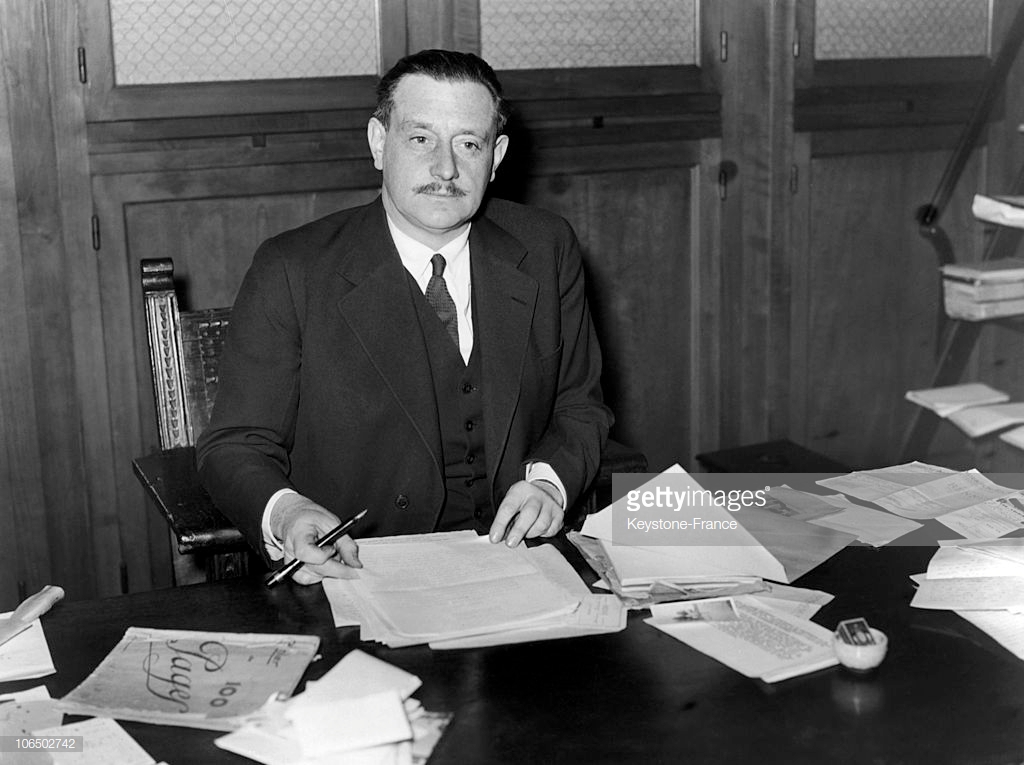 But there was one historian who did reveal the truth. Bernard Fay (1893-1978) left, was a Harvard-educated Frenchman. He is considered an "anti-Mason" because his 1935 book, "Revolution and Freemasonry: 1680-1800" is one of few to reveal the extent of Masonic participation in the US and French Revolutions.
But there was one historian who did reveal the truth. Bernard Fay (1893-1978) left, was a Harvard-educated Frenchman. He is considered an "anti-Mason" because his 1935 book, "Revolution and Freemasonry: 1680-1800" is one of few to reveal the extent of Masonic participation in the US and French Revolutions.
He had access to Masonic archives in the US and Europe. His book is actually a sympathetic portrayal of Freemasonry with no references to its occult nature. However, as a Vichy Frenchman, he subsequently helped the Nazis identify Masons during World War Two. He was imprisoned after the war but pardoned in 1952 by Charles De Gaulle.
MASONIC AMERICA
Fay explains that in the 1770's, the US consisted of 13 isolated colonies with different governments, religions, customs, racial profiles, and social and political structures. There were intense rivalries and longstanding antagonisms. A letter took three weeks to get from Georgia to Massachusetts.
"Masonry alone undertook to lay the foundation for national unity in America because [as a secret society] it could spread throughout the colonies and work steadily and silently. It created in a limited but very prominent class of people a feeling of American unity without which... there would have been no United States." (p. 230)
"In 1760, there was no town, big or small, where Masonry had not spun its web. Everywhere it was preaching fraternity and unity." (230)
Benjamin Franklin, who was the Grand Master of a French lodge, raised millions of francs crucial to financing George Washington's army. He was the first to submit a plan for military collaboration and political federation. He established a chain of Masonic newspapers in all of the colonies. You can guess where he found the money.
Fay says George Washington and his ragtag army kept the spirit of independence alive. He organized many military lodges and personally participated in their activities. On Dec. 27,1778, he led a parade after Philadelphia was recaptured: "His sword at his side, in full Masonic attire, and adorned with all the jewels and insignia of the Brotherhood, Washington marched at the head of a solemn procession of 300 brethren through the streets of Philadelphia to Christ Church, where a Masonic Divine Service was held. This was the greatest Masonic parade that had ever been seen in the New World." (246)
"His sword at his side, in full Masonic attire, and adorned with all the jewels and insignia of the Brotherhood, Washington marched at the head of a solemn procession of 300 brethren through the streets of Philadelphia to Christ Church, where a Masonic Divine Service was held. This was the greatest Masonic parade that had ever been seen in the New World." (246)
"All the staff officers Washington trusted were Masons, and all the leading generals of the army were Masons: Alexander Hamilton, John Marshall, James Madison, Gen. Greene, Gen. Lee, Gen. Sullivan, Lord Stirling, the two Putnams, Gen. Steuben, Montgomery, Jackson, Gist, Henry Knox and Ethan Allen were Masons. They all gathered around their Master Mason Washington and they all met at the 'Temple of Virtue,' 'a rude structure forming an oblong square forty by sixty feet, one story in height, a single entrance which was flanked by two pillars... The atmosphere which surrounded Washington was Masonic and it may be said that the framework of his mind was Masonic." (p. 250)
Imagine if Washington had shown the same devotion to Christianity. Fay points to a "curious" degree of coordination between Masons in the US and British armies:
"It seems even likely that the unforgettable and mysterious laxness of certain English military campaigns in America, particularly those of the Howe brothers, was deliberate and due to the Masonic desire of the English general to reach a peaceful settlement..." (251)
SURRENDER OF CORNWALLIS
In this context, it is pertinent to recall the confession of General Cornwallis when he surrendered to General Washington at Yorktown (Oct. 19, 1781.)
"Jonathan Williams recorded in his "Legions of Satan," (1781) that Cornwallis revealed to Washington that "a holy war will now begin on America, and when it is ended America will be supposedly the citadel of freedom, but her millions unknowingly will be loyal subjects to the Crown." ( British General Cornwallis's surrender at Yorktown, VA. Masonic hand sign indicates he was an insider.) The Crown is the Illuminati (i.e. shareholders of the Bank of England.) Cornwallis went on to explain what would seem a contradiction:
( British General Cornwallis's surrender at Yorktown, VA. Masonic hand sign indicates he was an insider.) The Crown is the Illuminati (i.e. shareholders of the Bank of England.) Cornwallis went on to explain what would seem a contradiction:
"Your churches will be used to teach the Jew's religion and in less than two hundred years, the whole nation will be working for divine world government. That government that they believe to be divine will be the British Empire. All religions will be permeated with Judaism without even being noticed by the masses, and they will all be under the invisible all-seeing eye of the Grand Architect of Freemasonry."
In a 1956 speech, Senator Joseph McCarthy reflected on these words:
"Cornwallis well knew that his military defeat was only the beginning of world catastrophe that would be universal and that unrest would continue until mind control could be accomplished through a false religion. What he predicted has come to pass. A brief sketch of American religious history and we have seen Masonry infused into every church in America with their veiled Phallic religion."
 CONCLUSION
CONCLUSION
We don't recognize the Judeo-Masonic conspiracy because we are not accustomed to thinking in terms of hundreds of years. But the Illuminati bankers have been plotting the "new order of the ages" (featured on the US dollar along with the uncapped Masonic pyramid) for thousands of years.
We may have the pleasure and pain of witnessing their design come to fruition. As we do, it is worth remembering that Americans, in fact all peoples, have allowed themselves to be duped.
Our role is analogous to that of the French nobles who collaborated in the French Revolution and then were slaughtered. Fay writes: "All these nobles did not hesitate to side with the revolutionary party, even though it was to cost them their rank, their estates and their lives." (p. 287)
In the words of a speaker at a secret B'nai Brith meeting in Paris in 1936:
"Yet it remains our secret that those Gentiles who betray their own and most precious interests, by joining us in our plot should never know that these associations are of our creation and that they serve our purpose...
"One of the many triumphs of our Freemasonry is that those Gentiles who become members of our Lodges, should never suspect that we are using them to build their own jails, upon whose terraces we shall erect the throne of our Universal King of Israel; and should never know that we are commanding them to forge the chains of their own servility to our future King of the World."
------Related- Harrell Rhome- The Occult Origins of the American NationErnst Zundel - Freemasonry has Doomed Western SocietyMakow-----Media Masks Masonic Control---------------Masons Stage Political Charade-------------- Rothschilds Murdered at Least Seven US Presidents---------------Freemasonry-The Elephant in the Room------------ Freemasonry- Mankind's Death Wish-------------- Freemasonry- The Elephant in the Room----------- CNN's Take on Freemasonry------------- Jewish Organizations Want to Disarm Americans -
Site: Zero HedgeOntario To Debut World's First Small Modular Reactor, GE PredictsTyler Durden Thu, 05/08/2025 - 18:50
The world of nuclear energy and small modular reactors - which we believe is the next obvious secular bull market in energy - keeps moving forward.
Ontario officials have granted final approval for the construction of a small modular reactor (SMR) developed by GE Vernova Hitachi Nuclear Energy, according to new reporting from Axios.
This reactor, known as the BWRX-300, is anticipated to be the first SMR to become operational in the Western world. The 300-megawatt unit will be located next to the existing Darlington Nuclear Station, operated by Ontario Power Generation. Once completed, it will generate enough electricity to power approximately 300,000 homes.
The successful implementation of this reactor at the Darlington site is expected to serve as a model for the feasibility and benefits of SMR technology.
Ontario’s energy ministry emphasized the significance of the project, noting that it will be the first SMR of its kind among G7 nations. GE has stated that early site preparations have been completed and full construction will commence soon, with the reactor projected to begin operations by 2030, the report says.
The Darlington site is planned to host a total of four SMR units, all of which are expected to be operational by 2035. The entire project is estimated to cost 20.9 billion Canadian dollars, which is about 15.06 billion USD. According to Stephen Lecce, Ontario’s energy minister, this initiative is a crucial part of the province's strategy to meet an anticipated 75% increase in electricity demand by 2050.
"Ensuring that we have reliable, affordable energy is essential to the economic sovereignty of our province and country," Lecce said.
Recall just days ago nuclear names popped on news that The White House is poised to issue executive orders aimed at accelerating the deployment of nuclear reactors across the United States.
The White House actions are expected to leverage the Departments of Defense and Energy to expedite reactor deployment, potentially circumventing delays from the Nuclear Regulatory Commission (NRC).
This initiative aligns with the administration’s strategy to meet the surging energy demands driven by sectors like artificial intelligence and advanced manufacturing.
Publicly traded companies positioned to benefit from this nuclear expansion include our favorite, Oklo, formerly backed by OpenAI CEO Sam Altman. The company is among eight companies selected to provide microreactors for U.S. military bases, aiming to supply 100% of critical energy needs at these sites.
The ADVANCE Act of 2024, signed into law in July, aims to streamline the licensing process for advanced nuclear technologies, reduce regulatory costs, and promote the development of next-generation reactors.
Additionally, in a rare show of bipartisan agreement, the Biden administration had formerly expressed intentions to triple the nation’s nuclear power capacity by 2050, recognizing nuclear energy’s role in achieving carbon-free electricity goals.
For those who missed it, in our note "The Next AI Trade" from April 2024, more than one year ago, we outlined various investment opportunities for powering up America, most of which have dramatically outperformed the market since then.
-
Site: Fr. Z's BlogPlease join me in thanking Our Lord for the election of Pope Leo XIV, Successor of Saint Peter, as the Shepherd of the Church throughout the world. The Shrine of Our Lady of Guadalupe at La Crosse has a particularly … Read More →
-
Site: Zero HedgeWashington Should Take Efficiency SeriouslyTyler Durden Thu, 05/08/2025 - 18:25
Authored by Nancy Brinker via RealClearPolitics,
DOGE is saving billions and it’s doing what voters asked for.
As someone who has represented the United States abroad, first as ambassador to Hungary and later as U.S. chief of protocol, I’ve seen how American leadership is measured not just by strength or ideals, but by functionality. Our allies watch how we govern ourselves. And too often, what they’ve seen in recent decades is an increasingly bloated federal government, mired in duplication, inefficiency, and bureaucratic inertia.
That’s why the work of the Department of Government Efficiency, or DOGE, deserves serious consideration. Led by Elon Musk, DOGE has taken on a task that most administrations have promised but failed to achieve: modernizing how our federal government operates. It has consolidated overlapping offices, canceled wasteful contracts, sold underutilized properties, and implemented data-driven reforms, all aimed at reducing cost, improving performance, and saving taxpayer money.
Since it began in January, DOGE has either cut or reduced grants, leases, and contracts in over 176 departments or agencies. On its website the department reports saving $160 billion. For comparison, that’s more than the entire annual budget of the Department of Transportation. Even according to independent data and analysis, DOGE efforts have already generated billions in savings. This is not a theoretical exercise in reform. It is tangible, measurable, and aligned with what the American people have repeatedly said they want: a government that delivers more by doing less.
Polling backs this up. A February Harvard CAPS/Harris poll found that 72% of Americans support the existence of an agency focused solely on eliminating waste and inefficiency in government. A clear majority (60%) said they believe DOGE is helping to rein in unnecessary federal spending. That’s not a left-wing or right-wing perspective; that’s a mainstream one.
DOGE’s creation may have sparked controversy, particularly among those uncomfortable with Musk’s unconventional approach and public persona. But we shouldn’t allow style to eclipse substance. If government is functioning more effectively and at a lower cost to taxpayers, then we must look seriously at how those outcomes are being achieved, and what lessons can be responsibly applied more broadly.
Having served in federal roles that demand strict compliance with law, protocol, and tradition, I know firsthand that reform must operate within the boundaries of our values. Rule of law and adherence to institutional norms are non-negotiable. Yet so, too, is the need for honest appraisal: Much of our federal bureaucracy has become outdated, sprawling, and resistant to change. Streamlining is not an assault on government. It is, in fact, an affirmation of it – an attempt to make public institutions worthy of public trust.
Of course, DOGE’s approach is not without flaws. Musk himself has candidly admitted as much. Critics have questioned whether all reported savings are fully verified, and transparency around decision-making needs improvement. Oversight is not only appropriate – it’s essential. But the existence of imperfections should not be a pretext for dismissing a bold, productive effort to modernize government. We cannot let perfect be the enemy of progress.
It’s a time-honored tradition in Washington for good ideas to wither under partisan suspicion. But government reform should not be the property of any one party. For decades, both Republicans and Democrats have campaigned on promises to cut waste, modernize services, and rein in unnecessary spending.
DOGE is doing what many in both parties have failed to do: take those promises seriously.
The real question is not whether DOGE is controversial – it is. The real question is whether it is effective. So far, the evidence suggests that it is. The challenge ahead is to preserve that momentum, institutionalize the best of what DOGE is doing, fix mistakes, and ensure it is guided by transparency, accountability, and legal rigor.
This moment presents a rare opportunity: the chance to reshape how government operates in a way that is more responsive to the people it serves. Instead of vilifying reformers, we should come together around a shared goal that transcends politics: building a government that works.
If DOGE continues to help us get there, it deserves not derision, but support.
Nancy Brinker served as U.S. ambassador to Hungary and as chief of protocol during the George W. Bush administration. She is the founder of the Susan G. Komen Race for the Cure and the Promise Fund.
-
Site: Fr. Z's BlogThe 19th c. poet Giuseppe Gioachino Belli… Er Belli. He wrote satirical sonnets in the Roman dialect about life in Rome and took deadly aim at Rome’s priests, religious, prelates and popes. The speakers in the poems are shop keepers and … Read More →
-
Site: Zero HedgeOff The Rails: Amtrak Slashes 20% Of Management In $100 Million SavingsTyler Durden Thu, 05/08/2025 - 18:00
Amtrak is cutting roughly 20% of its senior management positions, aiming to reduce expenses amid uncertainty over President Donald Trump’s infrastructure investment plans, sources familiar with the matter told Bloomberg.
The federally-owned passenger railroad - which operates as a for-profit entity, is targeting $100 million in annual cost reductions through these cuts, a source disclosed anonymously, sharing details not publicly announced.
In an official statement, Amtrak confirmed the elimination of roughly 450 management roles, reiterating the goal of achieving $100 million in yearly savings. The company emphasized these layoffs only impact corporate-level positions and assured that operational railroad jobs would remain unaffected. As of 2024, Amtrak employs approximately 22,700 people. (what!?)
"Amtrak identified opportunities to better align resources with the important work we are doing for America," the statement reads.
Amtrak President Roger Harris communicated the details of these layoffs to employees in a recent letter, indicating that impacted staff would receive notifications in the first half of May. Additionally, the railroad has implemented a hiring freeze and halted promotions for management roles, Harris wrote.
"Amtrak is making a full review of our cost structure, which includes evaluating the size of our management staff," reads the letter, adding that leadership plans "to notify impacted employees in the first half of May."
Planning for these cuts reportedly began months ago, driven by uncertainty following Trump’s presidential victory and his subsequent moves to withhold previously approved grants. This has cast doubt over future infrastructure funding.
Significant projects potentially impacted by the management layoffs include new multi-billion-dollar rail tunnels in New York City and Baltimore, as well as a replacement of the Susquehanna River Bridge and other major initiatives along the Northeast corridor.
While construction on these major projects is currently ongoing, future financing—particularly funding initially expected from the fifth year of former President Joe Biden’s infrastructure bill—is now uncertain.
-
Site: southern orders
-
Site: Vox Cantoris
Unlike 2013, I had no chills and did not feel the urge to vomit, which is a good thing because I was dining with friends at a churrasqueira. As the curtains opened, I first said, "Let's see how he's dressed." He vested as a pope should vest. He also did not say, "good evening," nor did he ask that we bless him because we cannot bless him, we have no authority over him, and he blessed us. That says a lot, as does his name. But, an American? For what it's worth, notwithstanding some of his various X reposts, it also appears that he's a registered Republican!
V. Oremus pro Pontifice nostro Leo.
R. Dominus conservet eum, et vivificet eum, et beatum faciat eum in terra, et non tradat eum in animam inimicorum eius. [Ps 40:3]
Deus, omnium fidelium pastor et rector, famulum tuum Leo, quem pastorem Ecclesiae tuae praeesse voluisti, propitius respice: da ei, quaesumus, verbo et exemplo, quibus praeest, proficere: ut ad vitam, una cum grege sibi credito, perveniat sempiternam. Per Christum, Dominum nostrum. Amen.
Pater Noster, Ave Maria.
V. Let us pray for Leo, our Pope.
R. May the Lord preserve him, and give him life, and make him blessed upon the earth, and deliver him not up to the will of his enemies. [Ps 40:3]
Our Father, Hail Mary.
O God, Shepherd and Ruler of all Thy faithful people, look mercifully upon Thy servant Leo, whom Thou hast chosen as shepherd to preside over Thy Church. Grant him, we beseech Thee, that by his word and example, he may edify those over whom he hath charge, so that together with the flock committed to him, he may attain everlasting life. Through Christ our Lord. Amen.
-
Site: Edward FeserPresident Trump has repeatedly called for U.S. acquisition of Greenland. The motivations have to do with Greenland’s strategic location and access to its mineral reserves. Neither the government of Denmark (of which Greenland is a territory), nor the people of Greenland themselves, are in favor of the idea. Not only is Trump undeterred by those facts, he has repeatedly refused to rule out the possibility of using military force to annex the island. For example, in January, when asked whether he could assure the world that he would not resort to military coercion to get control of Greenland, Trump replied “No, I can’t assure you” and “I’m not going to commit to that.” Asked this month about using military force to take Greenland, Trump said that “it could happen, something could happen with Greenland” and “I don’t rule it out.”
However, such military action would be manifestly contrary to the criteria of traditional just war theory. And even if the threat is intended merely as a negotiating tactic (as is likely), it would be contrary to the natural law principles governing international relations. These facts should be obvious to all, and would have been until recently. But Trump’s most ardent supporters have an alarming tendency reflexively to defend even the most outrageous things he does, cobbling together feeble rationalizations for words and actions they would condemn had they come from anyone else. It is worthwhile, then, to set out the reasons why Trump’s statements regarding Greenland are indefensible.
Greenland annexation and just war criteria
Again, military action to annex Greenland would clearly be unjust. For it manifestly would not meet the “just cause” criterion of just war theory. One country can justly make war on another only when the other country is guilty of some rights violation grave enough for war to be a proportionate response. The most obvious example would be when a country goes to war in order to repel an aggressor. But neither Denmark nor Greenland is guilty of aggressing against the United States, or of any other violation of U.S. rights. Indeed, they are longtime allies of the U.S.
The fact that the United States would find Greenland’s location and resources useful for purposes of defense is irrelevant. If I would find it useful to take over my neighbor’s property in order to protect my own against robbers, that hardly gives me a right to do so. Indeed, it would make me a robber. Nor will it do to pretend that governments are somehow not bound by the same moral prohibition against robbery that binds individuals. As St. Thomas Aquinas writes:
As regards princes, the public power is entrusted to them that they may be the guardians of justice: hence it is unlawful for them to use violence or coercion, save within the bounds of justice... To take other people's property violently and against justice, in the exercise of public authority, is to act unlawfully and to be guilty of robbery. (Summa Theologiae II-II.66.8)
The injustice of wars of territorial expansion is not a matter of controversy among natural law theorists in the Thomistic tradition, but has long been the standard position. For example, Thomas Higgins’s Man as Man: The Science and Art of Ethics says that “war of aggression is the violent endeavor to deprive another people of independence, territory, or the like, for the sake of increasing one’s own power and prestige… The Natural Law forbids all wars of aggression” (p. 543). Austin Fagothey’s Right and Reason notes that “territorial aggrandizement, glory and renown, envy of a neighbor’s possessions, apprehension of a growing rival, maintenance of the balance of power… these and the like are invalid reasons” for going to war (p. 564). Fagothey also notes that though it can under certain circumstances be licit for a country to acquire new land, this would not be true of “land… recognized as the territory of an existing state,” and that “an existing state may not be deprived of its territory” (p. 547).
The seriousness of these points cannot be overstated. The problem is not just that the forced annexation of Greenland would amount to robbery on a massive scale. It is that, because it would result in deaths, such an unjust military action would be tantamount to murder. It would make the president a war criminal. It would be a massive injustice not only against the people of Greenland, but also against the American military, which Trump would be making an instrument of such criminality.
A negotiating tactic?
Many of Trump’s defenders would say that he isn’t serious about resorting to military force, but merely intends such rhetoric as a negotiating tactic. It is no doubt true that he intends it that way. It is also likely true that, at the end of the day, he would refrain from using such force, if only because the political costs would be too great.
It is significant, though, that in Trump’s most recent remarks, he seemed to draw a distinction between the situation with Greenland and the situation with Canada, which he has repeatedly said also ought to become part of the United States. Asked about the possibility of using military force to acquire Canada, Trump said: “Well, I think we're not going to ever get to that point” and “I don’t see it with Canada, I just don’t see it.” That is hardly an acknowledgement that acquiring Canada in such a way would be wrong, and thus to be ruled out absolutely. It sounds more like a judgment to the effect that attacking Canada would merely be unnecessary or impractical. But his answer in the case of Greenland is different. Again, he said that “it could happen, something could happen with Greenland” and “I don’t rule it out,” even if he also says that that too is unlikely. Overall, his remarks give the impression that he does indeed regard military action against Greenland as at least remotely possible. There is also the fact that the administration has now stepped up intelligence operations vis-à-vis Greenland.
In any event, even if this rhetoric is meant as a negotiating tactic, it is still gravely immoral. There are at least two ways that the refusal to rule out military action could function as a negotiating tactic. Trump might genuinely intend to keep the option open in order to frighten Denmark and Greenland into making a deal, even if he does not currently have any plan actually to resort to such action. Or he might merely be bluffing in order to frighten them into making a deal, but would not ever really carry out such action. Either of these tactics would be gravely wrong, though not in the same way.
John Finnis, Joseph Boyle, and Germain Grisez discuss the difference between genuinely keeping an option open and merely bluffing in their book Nuclear Deterrence, Morality, and Realism, and some of the points they make are relevant to the present topic.
Consider the first possibility, that Trump intends to keep open the option of taking military action against Greenland, but also hopes and believes that he will never have to carry this threat out. As Finnis, Boyle, and Grisez point out, it is a fallacy to suppose that if someone hopes and believes he never has to carry out a threat to do some action, then it follows that he does not really intend that action. The reality is rather that “people who fortunately avoid what they only reluctantly intend, or who might have a change of mind in the future, are people whose minds are now made up” (pp. 104-5). In the present case, if Trump really does want to keep the option open, then he does in the relevant sense have the intention of taking military action against Greenland if he cannot otherwise acquire it. That remains the case even if he also hopes and believes he will be able to acquire it peacefully.
But as we have seen, acquiring Greenland this way would violate just war criteria, and thus amount to murder. As Finnis, Boyle, and Grisez write of keeping open the option of carrying out a murderous act:
It would be doubly conditioned – conditional not only on an adversary’s act in defiance of the threat, but on a choice still to be made to execute it. None the less, that doubly conditioned intention would still be a murderous will. If one intends now to be in a position to commit murder, should one later decide that the situation warrants it, then even now one is willing (however reluctantly) to murder. (p. 111)
So, keeping open the option of taking military action against Greenland, even if intended just as a negotiating tactic, is still tantamount to an intention to murder, and is thus gravely immoral. Consider then the alternative scenario, on which Trump is merely bluffing. On this hypothesis, Trump does not in fact intend even to keep the military option open. He simply wants Denmark and Greenland to think that he is keeping it open. Even if this is what is going on, it is still gravely immoral for at least three reasons, the first two of which are set out by Finnis, Boyle, and Grisez.
First, when a country threatens an immoral military action, it is not only the intentions of its leaders that are morally relevant. Also relevant are the intentions of everyone else in some way connected to the action, from soldiers to ordinary citizens. In the present case, even if Trump himself is bluffing, the bluff can only work if it is not obviously a bluff – that is to say, if a critical mass of people think he really might carry out the threat. And that will lead at least some people (government officials, military personnel, and voters) to decide to support the action if he carries it out. That is to say, they will form the intention of supporting a murderous action. They will not be bluffing, even if Trump is. And as Finnis, Boyle, and Grisez write: “Those who deliberately bring others to will what is evil make themselves guilty, not only of the evil the others will, but also of leading them to become persons of evil will” (p. 119). In the case at hand, such a leader “would be inciting the others to intend to kill the innocent” (p. 120), even if he does not himself really intend to do so.
Second, it is not just what individuals do or will that is relevant. The military actions of a country are social acts, acts carried out by the society as a whole (understood as what is traditionally called a kind of “corporate person” or “moral person”). As Finnis, Boyle, and Grisez note, a team can rightly be said to intend to win a game, even if certain individual members of the team do not intend this but would rather lose. Similarly, even if a president is personally bluffing when he makes a threat, it doesn’t follow that the communal act of the United States as a country, in making the threat, amounts to a bluff. The reason is that “the social act… is defined by its public proposal” rather than by what this or that individual might privately think, “and that proposal is not a proposal to bluff” (pp. 122-23, emphasis added).
Extorted contracts are immoral
The third problem is this. Even if Trump is merely bluffing, the point of the bluff would be to frighten Denmark and Greenland into making an agreement they would not otherwise be willing to make. But this is sheer extortion and gangsterism. Moral common sense and traditional natural law theory alike hold that an agreement cannot be licit or binding if made under such unjust duress. As one standard manual of moral theology puts it:
The defects that vitiate consent by taking away knowledge or choice render contracts either void or voidable. These impediments [include]… fear, which is a disturbance of mind caused by the belief that some danger is impending on oneself or others… [and] violence or coercion, which is like to fear, the latter being moral force and the former physical force. (John McHugh and Charles Callan, Moral Theology, Vol. II, pp. 140-41)
To be sure, the reference here is to contracts between individuals, but natural law theorists standardly hold that, mutatis mutandis, what is true for agreements between individuals is true for treaties between nations. As Fagothey writes, “the conditions for a valid treaty are the same as those for any valid contract,” so that “if an unjust aggressor is victorious, the treaty he imposes is unjust and therefore invalid” (Right and Reason, pp. 549-50). And as another natural law theorist says, “a treaty made under duress, say, made under threat of war… can hardly be regarded as binding, or at least should be regarded as rescindible, if the conditions imposed are manifestly and flagrantly unjust” (Michael Cronin, The Science of Ethics, Vol. II, p. 658).
It is no defense of the president’s comments, then, to say that they are meant as a negotiating tactic rather than seriously evincing an intention to go to war. For a negotiating tactic of this kind is itself also gravely immoral.
-
Site: Zero HedgeTesla Tantrums: Consumer Choices In The Age Of Performative EthicsTyler Durden Thu, 05/08/2025 - 17:40
Authored by Patrick Keeney via The Epoch Times,
The French have an apt expression for those vexing moments when, having exited a spirited exchange, the perfect rejoinder belatedly arrives. They call it l’esprit de l’escalier—“the wit of the staircase.”
The phrase captures that all-too-human affliction of eloquence delayed. The sharp retort, the subtle riposte—these come not in the heat of dialogue but only after one has turned his back and descended the stairs. “If only I had said ...” It’s an experience with which I’m intimately familiar.
Yet every so often, I rise to the occasion. One such instance still affords a small measure of satisfaction. A visitor from England took it upon himself to scold me for driving a German automobile. He declared he could never own one, not after the destruction wrought by the Luftwaffe on England during the war. The implication was unmistakable: my vehicular choice constituted a moral failing. He drove, he proudly informed me, a Toyota Camry. For once, I replied in real time, “Ah, well, I could never own a Japanese car, not after what the Japanese Army did to our Canadian boys in Hong Kong.”
We changed the subject.
That brief exchange came to mind as I watched the recent paroxysms of hostility directed at Tesla.
Dealerships have been torched, vehicles vandalized, and owners accosted in parking lots by sanctimonious citizens, sneering moral condemnation.
It is not necessary to be a shareholder, Tesla owner, or admirer of Elon Musk to find this troubling. The issue transcends personalities or partisanship.
It is a symptom of a civic pathology, one where ideological grievance takes precedence over shared achievement, and where economic success is no longer a cause for celebration but a litmus test of political allegiance.
If Mr. Musk espouses views one finds disagreeable, there are democratic mechanisms to contest them.
But to vilify an entire enterprise—its workers, consumers, products—based on its founder’s political eccentricities is intellectual laziness masquerading as moral conviction.
It also prompts a deeper question, leading us to the heart of the matter: which corporations, if any, are so morally unblemished that we can consume their products without public disapproval? In an age increasingly saturated with virtue signalling and performative ethics, should we now consider our consumer choices as moral declarations?
If so, the standard quickly becomes untenable.
Consider Henry Ford, whose contributions to American industry were matched only by the virulence of his anti-Semitism.
Ford financed the dissemination of “The Protocols of the Elders of Zion,” a notorious forgery, and his newspaper, The Dearborn Independent, published material that later delighted Nazi propagandists. By the logic of ideological purity, must we now abandon our Fords and dismantle every endowment bearing his name?
Or ponder Apple. Lauded for its sleek design and innovation, the company has also drawn fire for its reliance on overseas manufacturing, particularly through Foxconn, where reports of dire labour conditions have prompted global concern.
Are we then to discard our iPhones, torch our MacBooks, and boycott the Apple Store as gestures of resistance?
Coca-Cola, Nestlé, Nike, and Amazon have all faced their respective reckonings—environmental degradation, exploitative labour, tax evasion, and anti-competitive conduct.
Even the so-called “green industries,” ostensibly paragons of sustainability, are entangled in troubling realities: the mining of cobalt and lithium (often involving child labour), the environmental toll of solar and wind technologies, and the geopolitical implications of rare earth extraction.
And what of legacy media organizations, whose selective coverage, ideological slant, and occasional falsehoods have sown confusion and deepened division? If we are to demand moral rectitude from our manufacturers, should we not hold our journalists and media organizations to the same standard?
The list is endless. In a fallen world, condemning every corporation and institution for its moral shortcomings takes little imagination. Yet, this is precisely the point: the moral outrage directed at Tesla is not principled but opportunistic. It is less about ethics and more about tribalism.
This is not to say that ethics should not play a role in commerce. Instead, it is to warn against the politicization of consumption, whereby our purchases become emblems of ideological identity. A society that demands moral perfection from its corporations but does so selectively, based not on a coherent principle but on partisan affinity, is not morally serious. It is merely moral theatre. The recent wave of anti-Tesla fervour has less to do with conscience than spectacle.
But moral seriousness requires more than slogans. It demands consistency, humility, and, most critically, an acknowledgment of our shared imperfection. Without these, protests that take us to task for our consumer habits are not acts of ethical resistance, but empty gestures—tribal totems in the theatre of cultural war.
Views expressed in this article are opinions of the author and do not necessarily reflect the views of The Epoch Times or ZeroHedge.
-
Site: AsiaNews.itBorn in Chicago, he is the first pontiff from North America who also served as bishop of Chiclayo and has Peruvian citizenship. For two terms he was prior general of the Augustinians, a religious order also present in many Asian countries. Pope Francis brought him to Rome in 2023 as prefect of the Dicastery for Bishops. In his words: 'My vocation, like that of every Christian, is to be a missionary, to proclaim the Gospel wherever one is.'
-
Site: Fr. Z's BlogPope Leo XIV greeted the city of Rome and the world with these words at his first appearance as the Successor of Peter from the Central Loggia of St Peter’s Basilica: Pope Leo XIV: Greetings to Rome and to the … Read More →
-
Site: Zero HedgeTrump Urges GOP To Raise Taxes On The Wealthy To Fund Economic Agenda: ReportTyler Durden Thu, 05/08/2025 - 17:20
President Donald Trump is urging Republican lawmakers to raise taxes on some of the wealthiest Americans as part of his sweeping new economic package - a move that US Commerce Secretary Howard Lutnick says he's 'in favor' of doing.
According to individuals familiar with the discussions, Trump is pushing for the creation of a new 39.6 percent tax bracket for individuals earning at least $2.5 million annually or couples making $5 million. The current top rate stands at 37 percent. If enacted, the measure would restore the top marginal rate to its pre-2017 level, effectively rolling back a key piece of President Trump’s own first-term tax cuts.
According to Bloomberg, Trump made his case in a phone call Wednesday with House Speaker Mike Johnson, where he also reiterated support for ending the carried interest tax break - a longstanding benefit claimed by private equity and venture capital managers, one source said.
Representative Jason Smith, the Missouri Republican who chairs the powerful House Ways and Means Committee, is expected to meet with President Trump on Friday. A congressional aide said Smith plans to assure the president that the forthcoming tax bill 'will deliver on the president’s priorities,' according to the aide.
While the proposal’s full contours remain under negotiation, it is not yet clear whether it would include an expansion of the existing small business income exemption under the individual tax code.
The push to raise the top rate comes as House Republicans face mounting fiscal pressure in drafting what President Trump has labeled the “one big beautiful bill” — a multi-trillion-dollar package aimed at extending the 2017 tax cuts while enacting a range of new promises, including eliminating taxes on tips and overtime pay.
To finance the plan, GOP leaders have struggled to find consensus on cuts to entitlement programs such as Medicaid, prompting President Trump to float alternatives. Despite concerns that taxing high earners could harm Republicans politically or drive wealth abroad, President Trump has increasingly suggested such a move might be necessary.
Raising taxes goes against long-standing Republican orthodoxy. Trump’s willingness to propose a tax hike for millionaires demonstrates how much he has remade the GOP in his own populist image. Top Republicans have balked at other proposals that would raise levies on affluent households. -Bloomberg
“Anytime the president asks for something, we will consider it,” said Representative Kevin Hern of Oklahoma, a member of the House tax-writing committee. He confirmed that both the new top rate and carried interest repeal are “under discussion” but emphasized that “there is no agreement yet.”
In the Senate, the reaction has been more measured. Senator Mike Crapo of Idaho, the top Republican on the Senate Finance Committee, told conservative talk show host Hugh Hewitt on Thursday that he’s “not excited” about the tax hike but acknowledged that “there are a number of people in both the House and the Senate who are.”
“If the president weighs in in favor of it,” Crapo added, “then that’s going to be a big factor that we have to take into consideration.”
As Republicans weigh how to advance President Trump’s second-term tax ambitions, the question of who pays — and how much — is shaping up to be a defining test of the president’s enduring sway over the party’s economic direction.
-
Site: Henrymakow.com
 Famine is eating away at our bodies. Today I got a little inedible wheat and a small onion. We cooked it and gathered 9 of us to eat it. As you can see!Please send links and comments to hmakow@gmail.com
Famine is eating away at our bodies. Today I got a little inedible wheat and a small onion. We cooked it and gathered 9 of us to eat it. As you can see!Please send links and comments to hmakow@gmail.com
"We are not only dying under bombs... We are dying now: From hunger, oppression, isolation, and the world's silence."I write this update from the heart of Gaza, For those who still carry a shred of humanity... For those wondering: how are we living? In truth, we are silently dying.The situation has become unbearable. We no longer fear the bombs as much as we fear hunger.Bread has disappeared. Flour is gone. Mothers grind what's left of rice or lentils to bake on wood fires, just so a child feels they've eaten something. Baby formula is unavailable. We now drink salty water. Even tree leaves are no longer an option for those thinking of cooking them.Markets are empty... No vegetables, no oil, no sugar, nothing. We wait in long lines under the sun or rain, hoping for a loaf of bread , if it exists , and often return with nothing.Famine is not an exaggeration... It's the reality we live every hour.Children have become walking skeletons. Women faint from hunger while cooking , if there is anything to cook. The elderly do not complain... because no one is listening anymore.Chaos is rising... Hunger has driven some to steal. Hunger has turned kindness into weakness, and silence into slow death. Chaos prevails because stomachs are empty, and hearts are broken.I am Yamen, Not a journalist, not an activist, not seeking fame. I'm just a Palestinian young man trying to share his pain... and the pain of his family... and the pain of two million people trapped in this hell.All my life, I dreamed of holding my child and playing with them, But now... I fear marriage. I fear bringing a child into this cruel world. And I thank God that all my attempts to get married have failed. Because I don't know what I would say if my child screamed at me: "Feed me!"I don't write these words to seek pity... I write them to scream with whatever voice we have left.We are not only dying under bombs... We are dying now: From hunger, oppression, isolation, and the world's silence.I write these words with a broken heart, I write them while I am hungry, Knowing that the ugliest phase of this war is not the bombs, But this phase: The phase of deliberate siege and starvation of an entire people.To those who care... read this. To those with a conscience... share it. Because we have nothing left but our words... And because silence today is a crime.-- Alex Jones Turns On Trump Admin After Accusing Pam Bondi of 'Covering Up Epstein' Files: 'The White House Already Knows'Human Trafficking Whistleblower Ryan Matta joins Stew Peters for an EXCLUSIVE in-studio interview exposing the true horrors of the United States Government funded global child sex trafficking operation.Trump also is a Pedophile!Satanic Luciferian Pedophiles The Monsters That Walk Among Us Part I: PIZZAGATE!Note: : Trump was on Epstein flight logs at least 7 times.The Depopulation AgendaA nuclear war between India and Pakistan in May 2025 was 'predicted' in 2019!"On 22 April 2025, a deadly attack in Pahalgam, kashmir, claimed 26 lives, mostly Hindu tourists. The Resistance Front initially took responsibility before retracting. India swiftly blamed Pakistan for supporting cross-border terrorism, an accusation Islamabad firmly denied. In response, India suspended the Indus Waters Treaty, expelled Pakistani diplomats, and sealed its borders. Pakistan retaliated in kind, and both sides reported ceasefire violations along the Line of Control beginning 24 April. By 30 April, India had closed its airspace to Pakistani carriers. With tensions soaring, global powers, including the UK and US, urged both nuclear nations to step back from the brink.India and Pakistan each possess an estimated 170 nuclear warheads within their respective military arsenals. As such, a nuclear exchange between the two nations would involve the detonation of merely three per cent of the world's total nuclear stockpile. However, even such a limited exchange, carried out over a brief period, could result in the immediate deaths of over 100 million people and trigger profound climatic disruption on a global scale."-
Alex Jones Turns On Trump Admin After Accusing Pam Bondi of 'Covering Up Epstein' Files: 'The White House Already Knows'Human Trafficking Whistleblower Ryan Matta joins Stew Peters for an EXCLUSIVE in-studio interview exposing the true horrors of the United States Government funded global child sex trafficking operation.Trump also is a Pedophile!Satanic Luciferian Pedophiles The Monsters That Walk Among Us Part I: PIZZAGATE!Note: : Trump was on Epstein flight logs at least 7 times.The Depopulation AgendaA nuclear war between India and Pakistan in May 2025 was 'predicted' in 2019!"On 22 April 2025, a deadly attack in Pahalgam, kashmir, claimed 26 lives, mostly Hindu tourists. The Resistance Front initially took responsibility before retracting. India swiftly blamed Pakistan for supporting cross-border terrorism, an accusation Islamabad firmly denied. In response, India suspended the Indus Waters Treaty, expelled Pakistani diplomats, and sealed its borders. Pakistan retaliated in kind, and both sides reported ceasefire violations along the Line of Control beginning 24 April. By 30 April, India had closed its airspace to Pakistani carriers. With tensions soaring, global powers, including the UK and US, urged both nuclear nations to step back from the brink.India and Pakistan each possess an estimated 170 nuclear warheads within their respective military arsenals. As such, a nuclear exchange between the two nations would involve the detonation of merely three per cent of the world's total nuclear stockpile. However, even such a limited exchange, carried out over a brief period, could result in the immediate deaths of over 100 million people and trigger profound climatic disruption on a global scale."- Tulsi Gabbard Exposes Fauci's Ukraine Biolabs as Adrenochrome Factories"The truth is, adrenochrome was being produced at Fauci's Wuhan lab before the plandemic hit - yes, the elite's drug of choice, sourced from the tortured and adrenalized blood of the young.Ukraine is the global capital of the child sex trade and investigators warn it is home to a network of adrenochrome factories. This is why the streets of towns and cities across Ukraine are lined with missing children posters.How many of these children were trafficked through Fauci's biolab network?Did you know Adrenochrome is still available for purchase from over 119 global suppliers, including the Wuhan lab funded by Fauci's Eco Health Alliance?"---The War the USA is Losing Isn't to China"But while the United States has spent the last few decades asserting global dominance through military and political interference, China has been building-literally and figuratively.Since 2013, China has invested over $1 trillion in infrastructure projects across Asia, Africa, and Europe through its Belt and Road Initiative (BRI). At home, it has constructed over 25,000 miles of high-speed rail, more than the rest of the world combined. In contrast, Amtrak's Acela Express - America's closest equivalent - reaches an average speed of just 65 mph. Even the recent $1.2 trillion U.S. infrastructure bill barely scratches the surface of what decades of disinvestment have eroded.China chose infrastructure. America chose interference.
Tulsi Gabbard Exposes Fauci's Ukraine Biolabs as Adrenochrome Factories"The truth is, adrenochrome was being produced at Fauci's Wuhan lab before the plandemic hit - yes, the elite's drug of choice, sourced from the tortured and adrenalized blood of the young.Ukraine is the global capital of the child sex trade and investigators warn it is home to a network of adrenochrome factories. This is why the streets of towns and cities across Ukraine are lined with missing children posters.How many of these children were trafficked through Fauci's biolab network?Did you know Adrenochrome is still available for purchase from over 119 global suppliers, including the Wuhan lab funded by Fauci's Eco Health Alliance?"---The War the USA is Losing Isn't to China"But while the United States has spent the last few decades asserting global dominance through military and political interference, China has been building-literally and figuratively.Since 2013, China has invested over $1 trillion in infrastructure projects across Asia, Africa, and Europe through its Belt and Road Initiative (BRI). At home, it has constructed over 25,000 miles of high-speed rail, more than the rest of the world combined. In contrast, Amtrak's Acela Express - America's closest equivalent - reaches an average speed of just 65 mph. Even the recent $1.2 trillion U.S. infrastructure bill barely scratches the surface of what decades of disinvestment have eroded.China chose infrastructure. America chose interference. Faux conservative in Masonic handshake with CastreauFreemason Danielle Smith persecutes courageous cancer doctor.William Makis MD - BREAKING NEWS: BREAKING NEWS: Alberta Premier Danielle Smith's Office has stolen $142,815 from my STRIPE Account!This is open criminality by the UCP government, in collaboration with corrupt bureaucrats at Alberta Health Services and College of Physicians and Surgeons.They are trying to destroy my family!! I want to thank all my supporters and donors to my @GIVESENDGO Legal fund that has now raised $226,205 to help my family survive this horrific attack!!This is also a vicious attack on all cancer patients who have come to me for help. How evil are these people?Entire governments have collapsed from much smaller scandals than this crime that is being perpetrated in broad daylight. And there is nothing I can do to stop them from committing these crimes. I have all the documents, all the names involved."----
Faux conservative in Masonic handshake with CastreauFreemason Danielle Smith persecutes courageous cancer doctor.William Makis MD - BREAKING NEWS: BREAKING NEWS: Alberta Premier Danielle Smith's Office has stolen $142,815 from my STRIPE Account!This is open criminality by the UCP government, in collaboration with corrupt bureaucrats at Alberta Health Services and College of Physicians and Surgeons.They are trying to destroy my family!! I want to thank all my supporters and donors to my @GIVESENDGO Legal fund that has now raised $226,205 to help my family survive this horrific attack!!This is also a vicious attack on all cancer patients who have come to me for help. How evil are these people?Entire governments have collapsed from much smaller scandals than this crime that is being perpetrated in broad daylight. And there is nothing I can do to stop them from committing these crimes. I have all the documents, all the names involved."---- "Autism is caused by vaccines."According to RFK Jr, the CDC carried out a study in 1989 which showed a 1350% elevated risk for autism in the first 30 days among children who got the hepatitis B vaccine, compared to those who got it later, or didn't get it at all."There are hundreds and hundreds of studies. I've written a book called Thimerosal: Let the Science Speak, that has 1400 references and over 400 studies cited that link autism and other related neurological injuries to vaccines. There is no question about it.""If you listen to the propaganda that CDC tells you, yeah, vaccines don't cause autism, because it's propaganda. This is a captive agency that is intertwined and owned by the pharmaceutical industry."-"After a 500-year, mostly secret war against humanity on all imaginable fronts - financial, psychological, economical, biological, ideological, cultural, religious, educational, environmental, and military - one crime syndicate now rules the entire world.[i] Their biggest operation was The Great 20th Century Slaughter of Eurasia, with over 200 million deaths in staged world wars and revolutions, to destroy and control Eurasia's 13 Empires, and to launch the USA like a rocket, as their new and fourth hegemon."All wars are fake, but all war victims are real!A message for the 80th Anniversary of the WW2 Liberation Dayby Mees BaaijenToday I present you chapter B34 from my book The Predators versus The People:
"Autism is caused by vaccines."According to RFK Jr, the CDC carried out a study in 1989 which showed a 1350% elevated risk for autism in the first 30 days among children who got the hepatitis B vaccine, compared to those who got it later, or didn't get it at all."There are hundreds and hundreds of studies. I've written a book called Thimerosal: Let the Science Speak, that has 1400 references and over 400 studies cited that link autism and other related neurological injuries to vaccines. There is no question about it.""If you listen to the propaganda that CDC tells you, yeah, vaccines don't cause autism, because it's propaganda. This is a captive agency that is intertwined and owned by the pharmaceutical industry."-"After a 500-year, mostly secret war against humanity on all imaginable fronts - financial, psychological, economical, biological, ideological, cultural, religious, educational, environmental, and military - one crime syndicate now rules the entire world.[i] Their biggest operation was The Great 20th Century Slaughter of Eurasia, with over 200 million deaths in staged world wars and revolutions, to destroy and control Eurasia's 13 Empires, and to launch the USA like a rocket, as their new and fourth hegemon."All wars are fake, but all war victims are real!A message for the 80th Anniversary of the WW2 Liberation Dayby Mees BaaijenToday I present you chapter B34 from my book The Predators versus The People:









